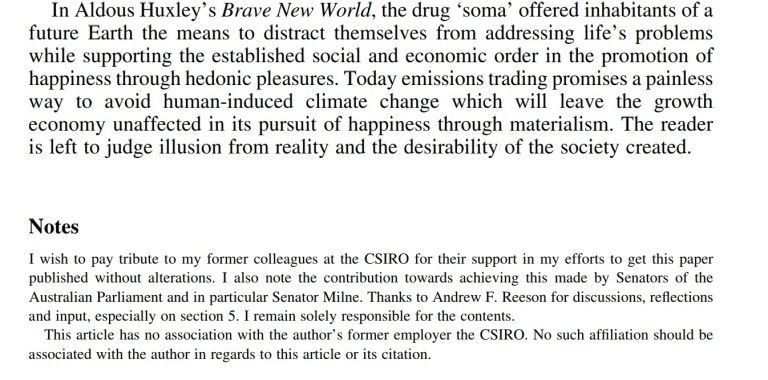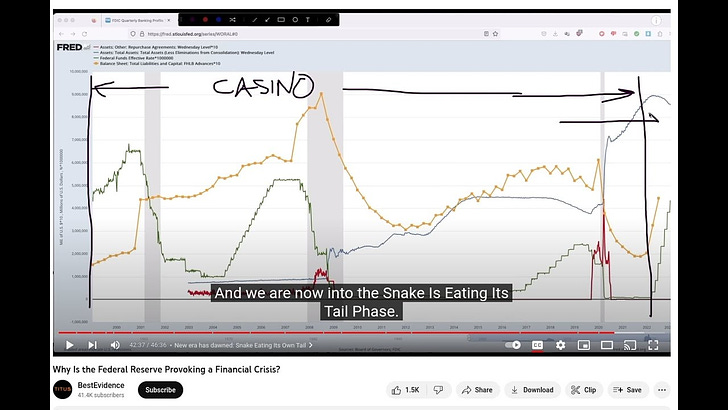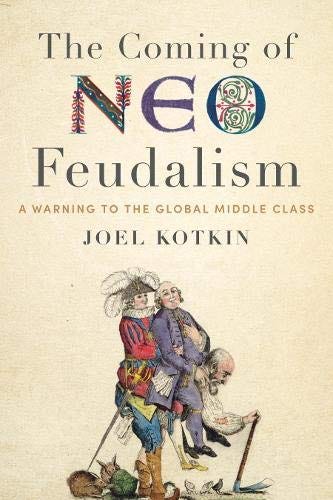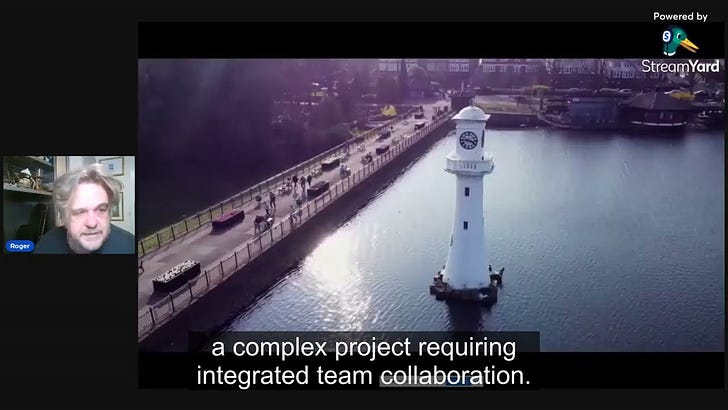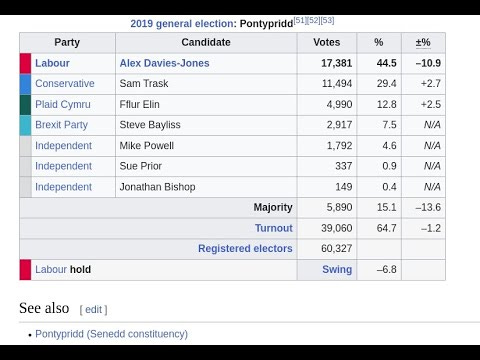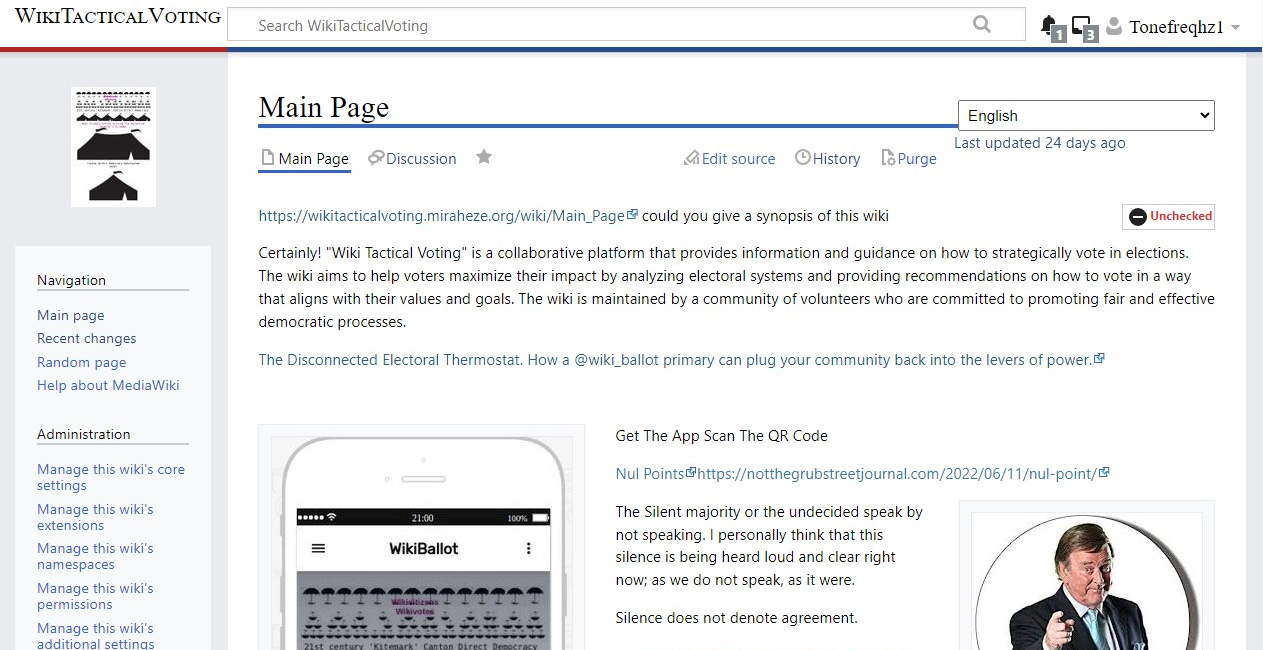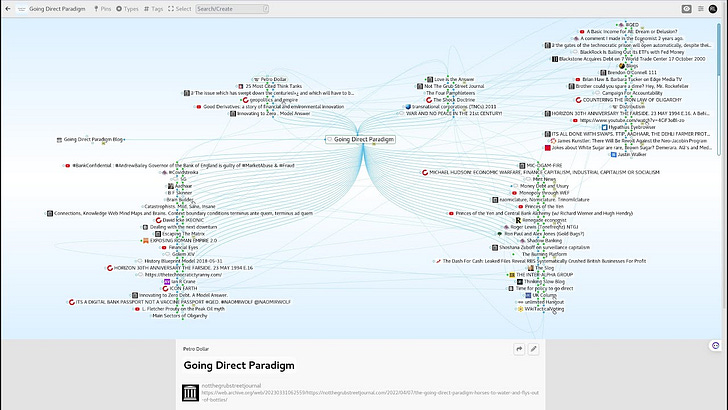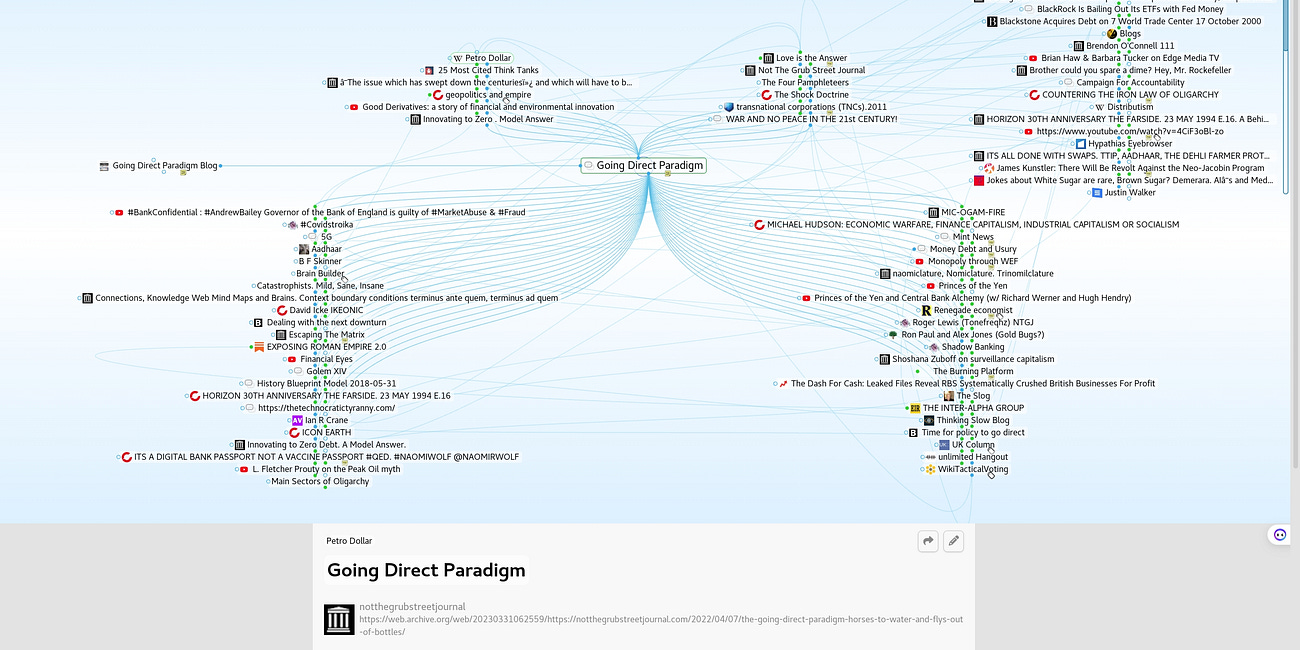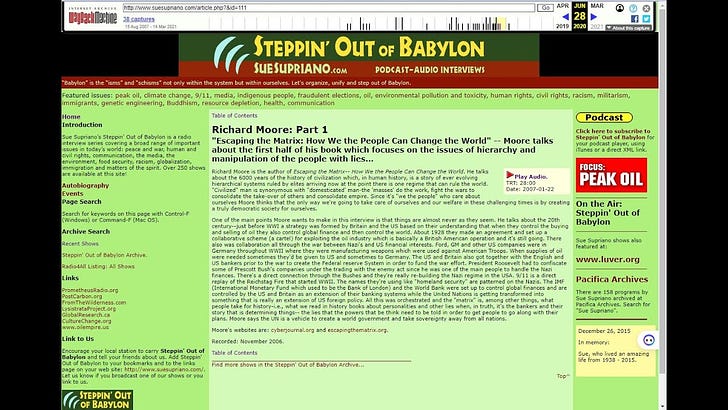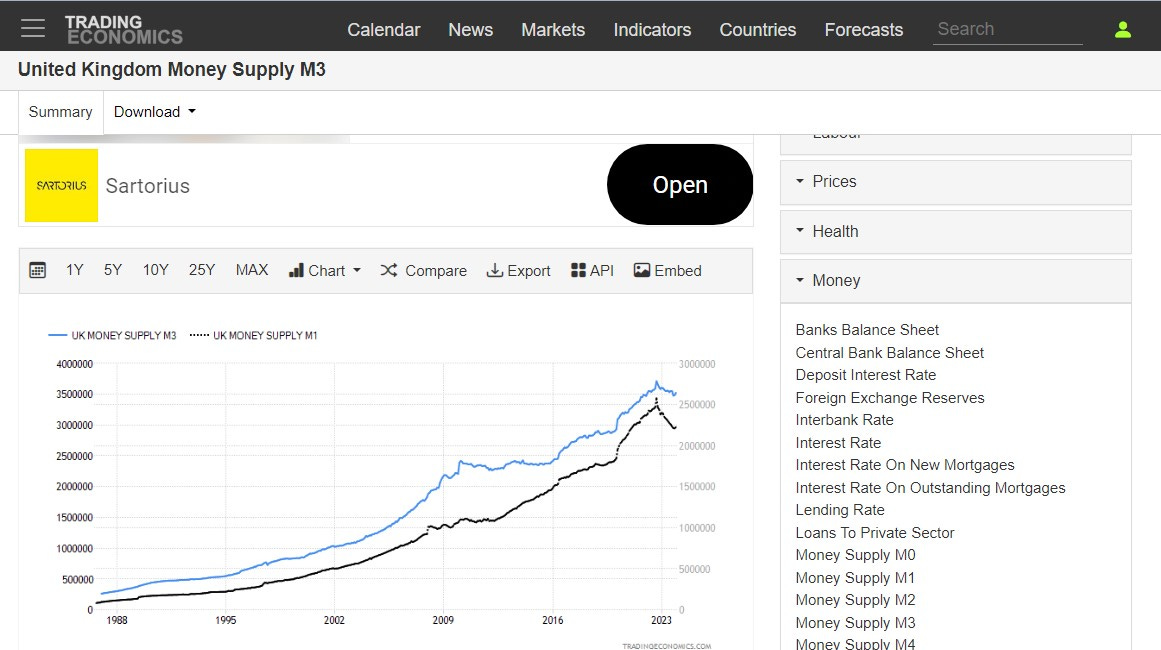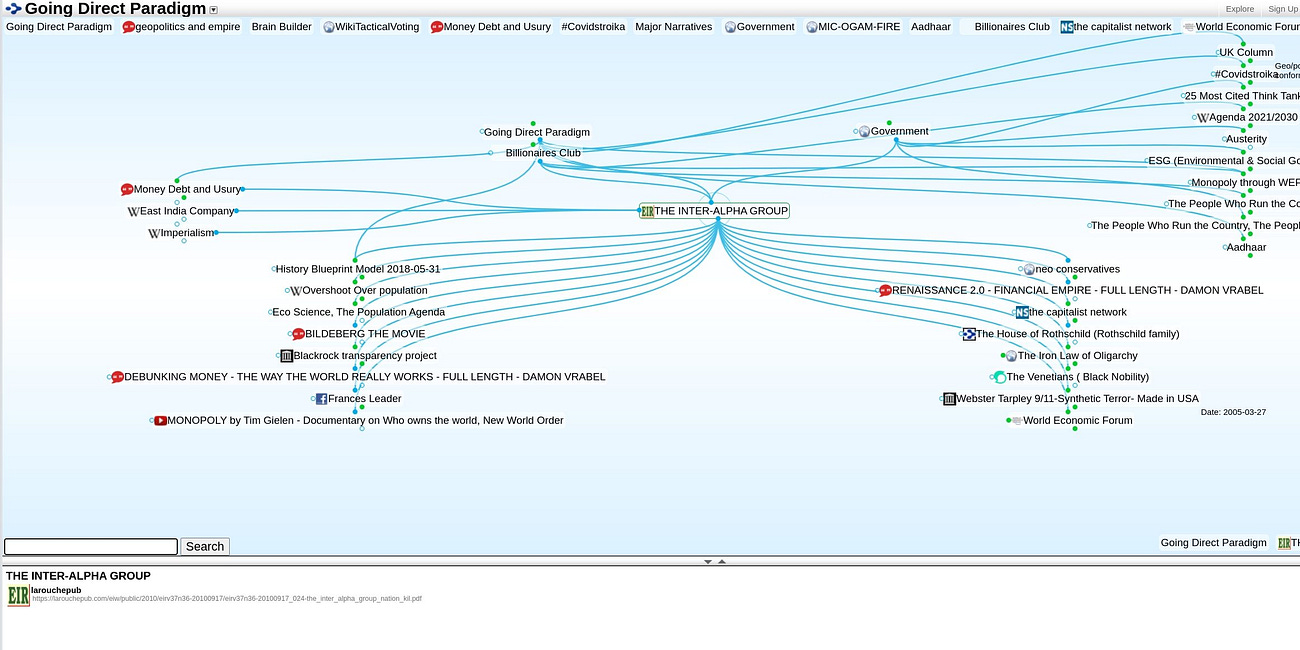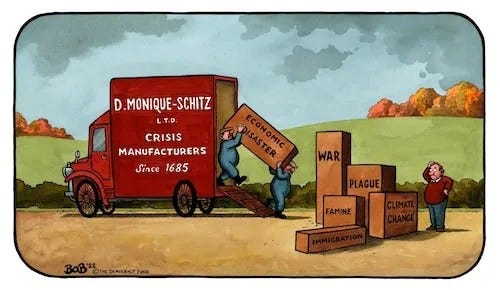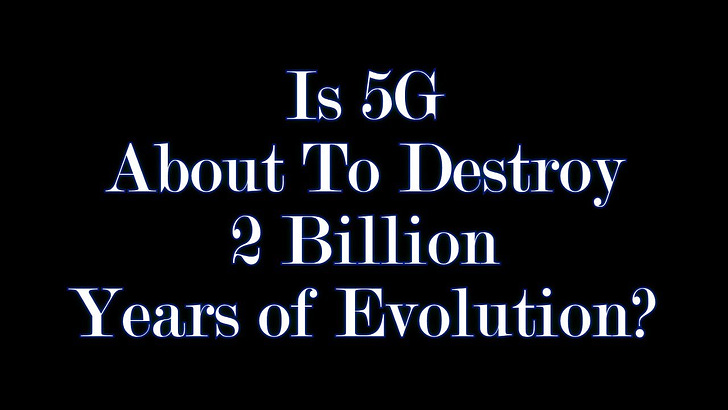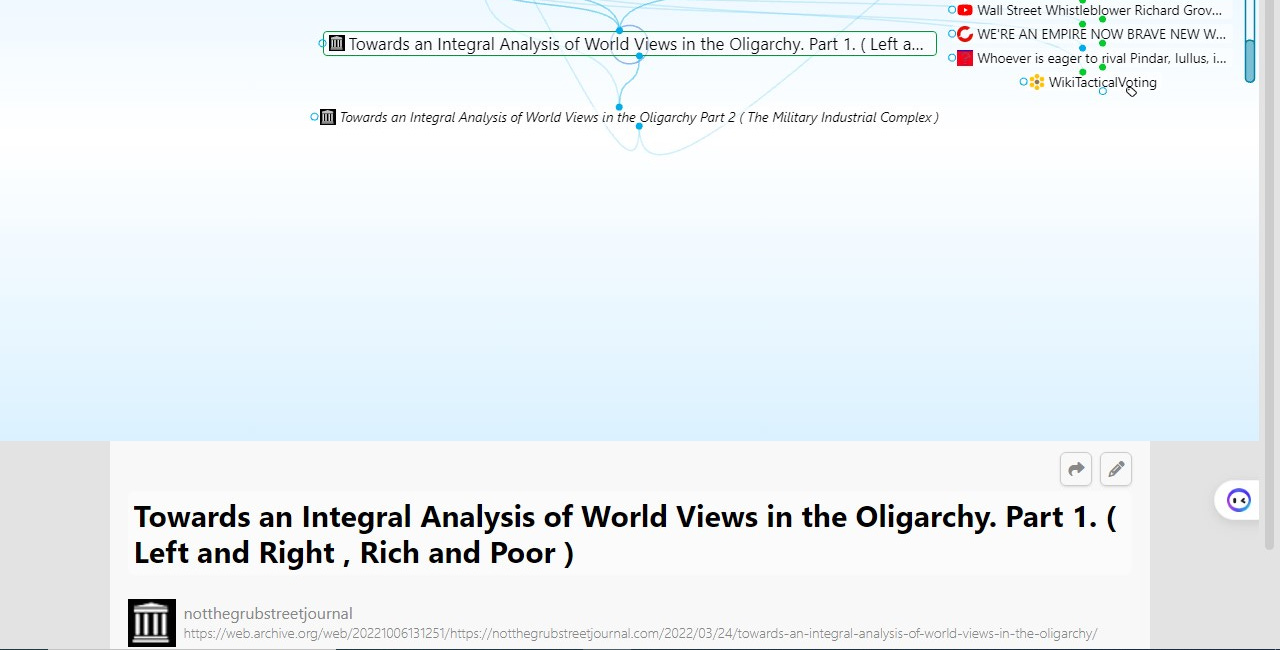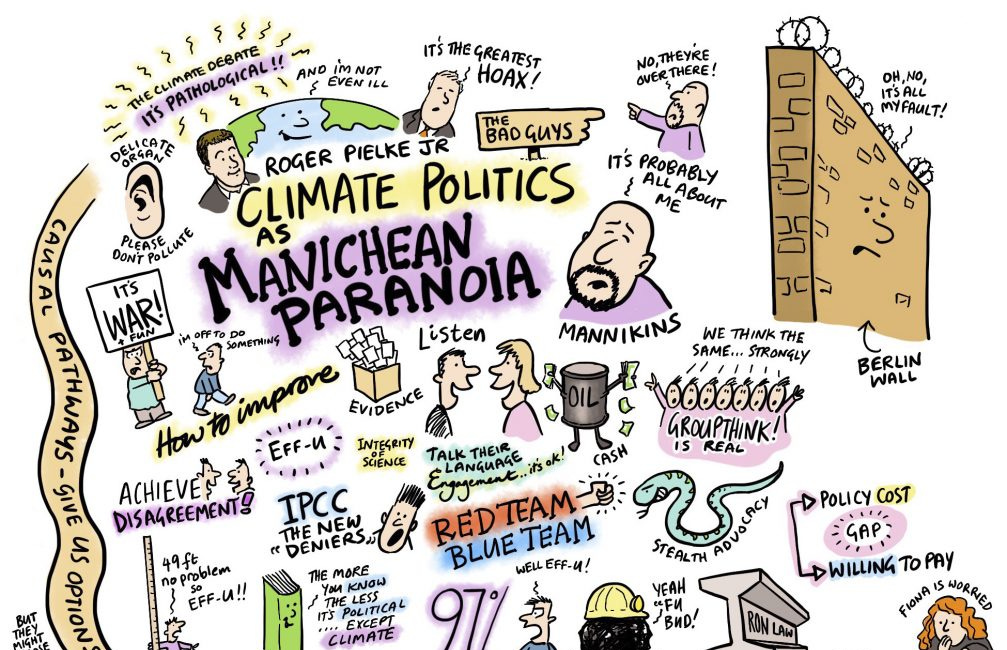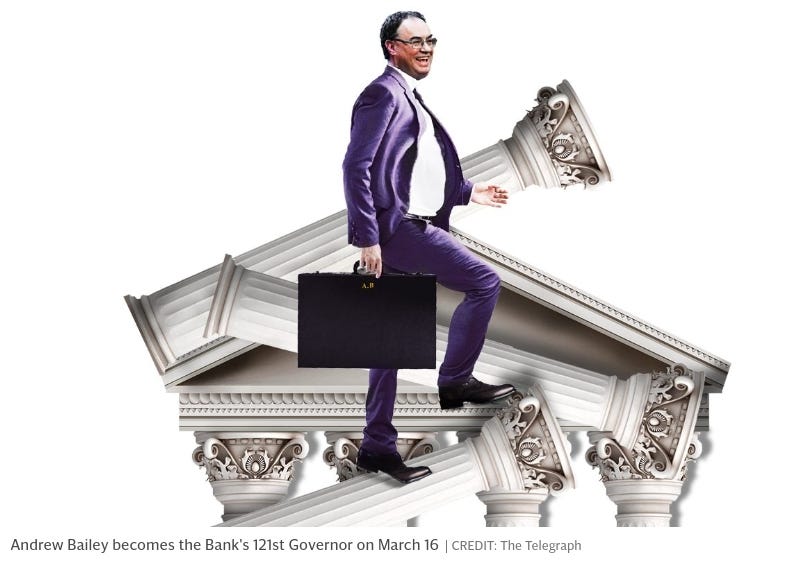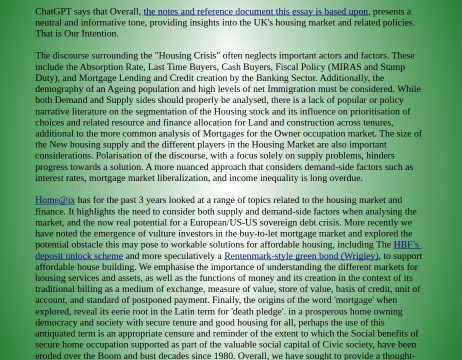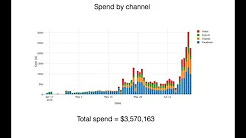The Going Direct Spring 2024
An analysis of these present discontents, A Burkean response to Sunack's Whig Junto.
The Going Direct Paradigm Spring of 2024 represents a pivotal juncture in Civil Society, global business, and governance, as it is deeply rooted in the historical context of political and economic events in the Mid 1970s, The early 2000s ( Dot Com Bubble), The 2008 GFC and the Events Before, During and after the Covid19 “Event 201” Going Direct “Flu De Tat”.
The framework of understanding surrounding this paradigm is underpinned by a comprehensive analysis that emphasizes the importance of authentic research and informed decision-making. The evolution of the internet and information intermediaries has transformed the dynamics of power and influence, leading to a pressing need for proactive and informed action. Furthermore, the integration of historical context, philosophical perspectives, and technological advancements is essential in navigating the complexities of the contemporary geopolitical and economic landscape. Through a multidisciplinary approach that draws from diverse fields, we can develop strategies for ethical decision-making and sustainable business practices. As we look ahead to the Going Direct Paradigm Spring of 2024, it is imperative to embrace a holistic understanding of the evolving geopolitical and economic dynamics, leveraging historical insights and philosophical frameworks to shape a sustainable and ethical future for global business and governance. This necessitates a commitment to informed decision-making and proactive engagement with global challenges, recognizing the role of trust, belief, and motivation in shaping our understanding and actions. By harnessing historical insights, philosophical perspectives, and technological advancements, we are poised to make informed decisions that contribute to a positive and ethical future for Civil Society, global business, and governance.
In the great tradition of starting at the beginning, we will start with a closing statement.
X. Closing Statement
A. Reflection on the Journey
1. Evaluation of personal growth and intellectual exploration
2. Commitment to continued learning and sharing of knowledge
The Problem of Monopoly.
“The rights of men, that is to say, the natural rights of mankind, are indeed sacred things; and if any public measure is proved mischievously to affect them, the objection ought to be fatal to that measure, even if no charter at all could be set up against it. If these natural rights are further affirmed and declared by express covenants, if they are clearly defined and secured against chicane, against power, and authority, by written instruments and positive engagements, they are in a still better condition: they partake not only of the sanctity of the object so secured but of that solemn pub∣lic faith itself, which secures an object of such importance. Indeed this formal recognition, by the sovereign power, of an original right in the subject, can never be subverted, but by rooting up the holding radical principles of government, and even of society itself. The charters, which we call by distinction great, are public instruments of this nature; I mean the charters of King John and King Henry the Third. The things secured by these instruments may, without any deceitful ambiguity, be very fitly called the chartered rights of men.
These charters have made the very name of a charter dear to the heart of every Englishman—But, Sir, there may be, and there are charters, not only different in nature but formed on principles the very reverse of those of the great charter. Of this kind is the charter of the East India Company. Magna charta is a charter to restrain power and to destroy monopoly. The East India Charter is a charter to establish monopoly and to create power. Political power and commercial monopoly are not the rights of men; and the rights to them derived from charters, it is fallacious and sophistical to call "the chartered rights of men." These chartered rights, (to speak of such charters and of their effects in terms of the greatest possible moderation) do at least suspend the natural rights of mankind at large; and in their very frame and constitution are liable to fall into a direct violation of them.”
Burke, Edmund, 1729-1797.
“I am not one of those who think that the people are never in the wrong. They have been so, frequently and outrageously, both in other countries and in this. But I do say that in all disputes between them and their rulers the presumption is at least upon a par in favour of the people. Experience may perhaps justify me in going further. When popular discontents have been very prevalent, it may well be affirmed and supported that there has been generally something found amiss in the constitution or in the conduct of Government. The people have no interest in disorder. When they do wrong, it is their error, and not their crime. But with the governing part of the State it is far otherwise. They certainly may act ill by design, as well as by mistake.
These are the words of a great man, of a Minister of State, and a zealous assertor of Monarchy. They are applied to the system of favouritism which was adopted by Henry the Third of France, and to the dreadful consequences it produced. What he says of revolutions is equally true of all great disturbances. If this presumption in favour of the subjects against the trustees of power be not the more probable, I am sure it is the more comfortable speculation, because it is more easy to change an Administration than to reform a people.”
It’s Deja Vu all over again
We are Back to The Spring of 2019 in so many ways, an election pending, the Establishment Narrative worn to rags, and not sufficient material left in the Broken laces of the Authoritarian Jack Boots to tie a nice bow around the latest
https://en.wikipedia.org/wiki/Reality-based_community
In this weekend’s two blogs and the two lengthy chats with Ranjan, I have been indexing my conclusions ahead of “Being the change”, I wish to see in the world. Ranjan has 2 Substacks one with no posts but a great Name, Pedagodgy of the digitally oppressed. And This One for Financial Eyes.

― Paulo Freire, Pedagogy of the Oppressed
We are though as I said Back to The Spring of 2019, Let’s Make the Spring of 2024 The Going Direct Paradigm Spring.
INTRODUCTION
Edmund Burke was born at Dublin on the first of January, 1730. His father was an attorney, who had fifteen children, of whom all but four died in their youth. Edmund, the second son, being of delicate health in his childhood, was taught at home and at his grandfather’s house in the country before he was sent with his two brothers Garrett and Richard to a school at Ballitore, under Abraham Shackleton, a member of the Society of Friends. For nearly forty years afterwards Burke paid an annual visit to Ballitore.
The conversation between Ranjan and me covers a wide range of topics, including financial crises, political and economic ideologies, historical events, and literary references. The conversation delves into the complexities of monetary policy, historical figures' views on economics, and the impact of global events on society.
We highlight the importance of understanding historical context, as well as the influence of political and economic decisions on the lives of individuals. It also emphasizes the need for open dialogue and the exchange of ideas to address complex societal issues.
Our conversation touches upon the significance of legal frameworks, the role of central banks, and the impact of financial regulations on the economy. It also delves into the concept of conspiracy theories, the dynamics of power structures, and the psychological manipulation of fear in public discourse.
Overall, the conversation presents what we hope is a thought-provoking discussion on various socio-economic and political themes, encouraging critical thinking and analysis of historical and contemporary events.
I am continuing to work on the Source Blog, and will distill this blog and the source Blog into a referenced Wikipedia article on My Wikipedia Talk Page, at the end of this Blog the Affordable Housing Article was referenced using the same workflow processes that I have developed over the years.
So here is the Source Blog presented as a work in progress for now.
Philosophy, The Love of Truth. The Going Direct Paradigm Spring 2024. The people versus the Global Central Bank Complex.
"This secret, internal, and domestic evil not only exists but even overwhelms you before you can foresee it or examine into it."—Cicero, Against Verres, second pleading, I, 39, translated by Charles Duke Yonge (1903). Burke called it a behind-hand review when in his
March 26, 2017
ON THE PRESENT DISCONTENTS, BURKE OPINED #CONQUEST OF DOUGH
mais par impatience de souffrir
On the present discontents, Burke opined
Putin, Trump and Farage set courses un-entangled
Junker, Merkel, Call for straight ahead.
From Globalisation Unentangled, By Roger G Lewis
WE ARE HERE. March 4, 2024.
Then again its deja vu all over again, Winter 2019 has morphed into the Going Direct Paradigm Spring of 2024.
Under name Eric Blair. Written 2019/06/25, or June 25, 2019, or whichever convention, order of operations, or Formal semantic structure of indexing or Grammar you prefer, we are here according to the Ministry of Truth and The Head of the present Whig Junto, Rishi Sunak.
Source: Reuters Sat 2 Mar 2024 00.01 GMT
Rishi Sunak has claimed extremist groups in the UK are 'trying to tear us apart', in a hastily arranged statement late on Friday. Standing outside Downing Street, the prime minister condemned what he called 'a shocking increase in extremist disruption and criminality' after the 7 October massacre by Hamas and the Israeli invasion of Gaza. He also claimed democracy itself was a target as he condemned George Galloway's victory in Rochdale's by-election. One of the most divisive politicians in Britain, Galloway won almost 40% of the vote in a contest beset by chaos and controversy and dominated by the conflict in Gaza
Source: Reuters Sat 2 Mar 2024 00.01 GMT
March 3rd 2024.
There was another Emperor new clothes moment last week, Liz Truss who was at least elected by Conservative party members Said The Following:
Starts@ 0:48. “ I thought that if I got to the top of the tree I would be able to implement those conservative policies so you think once you're prime minister as a little girl I think if I get prime minister I'll be like Churchill I'll change the country that's not how it works exactly and what I discovered was that I was not holding the levers the levers were held by the bank of England by the office of budget responsibility they weren't held by the prime minister or the chancellor and I what I'm saying Steve is that if the bank of England Governor can't be sacked and the Prime Minister can be sacked then the bank of England Governor is going to have more power than the Prime Minister and that is a problem in a democracy”. ends @ 2:12
Liz Truss, Former UK Prime Minister. speaking at the Conservative Political Action Conference, Washington DC. February 2024.
“The people have no interest in disorder. When they do wrong, it is their error and not their crime. But with the governing part of the State, it is far otherwise. They certainly may act ill by design, as well as by mistake.
These are the words of a great man, of a Minister of State, and a zealous assertor of Monarchy. They are applied to the system of favouritism which was adopted by Henry the Third of France, and to the dreadful consequences it produced. What he says of revolutions is equally true of all great disturbances. If this presumption in favour of the subjects against the trustees of power be not the more probable, I am sure it is the more comfortable speculation, because it is more easy to change an Administration than to reform a people.”
Edmund Burke, These present discontents.
All Repetition is deliberate, that’s Deja Vu all over again for you.
and so is this.
“We Have All been here before”.
Cui Bono, The Interests of Sunaks Whig Junto. MOMO, The men in Grey suits stealing Time.
Published on Jun 24, 2023 at 11:31 AM
Welcome to Sunaks New Whig Junto
Under the name Eric Blair.
#QANON #ConquestofDough, Quigley Tragedy and Hope.
I went looking for “our” democracy but I couldn’t find it anywhere. The media is the Empire’s propaganda department, elections are pieces of Kabuki theatre designed to bamboozle the proles, and power-obsessed thieves, liars, torturers, and killers run the show.
This is hardly a new development. The exaggerated outrage and affected surprise every time the establishment’s crooked and devious ways are exposed is getting boring. Surveillance, manipulation, and deception (and lying about it at every turn) are part and parcel of full-spectrum dominance. Surely we all know this by now so what’s with the “OMG they are threatening our democracy [sic]” routine?
Is it, not time to admit that “our” democracy is as good as dead and won’t be resurrected until we get angry or desperate enough to take the fight to those who are killing it?
The internet has a way of making interaction with a digital device feel like something more…but until we are compelled to take action in the physical world we are just 21st-century armchair revolutionaries… all talk and no action. No revolution happens without risk, sacrifice, and, usually, violence and repression. In this brave new internet era, we can’t even muster enough energy and motivation to take to the streets and demand the UK government release, Julian Assange.
Anyone who believes the fight against global capitalism can be fought and won passively while sitting in a coffee shop and tinkering on a Five Eyes infiltrated communication device is sadly deluded.
Until we in the West rally around a vision that can replace the current political and economic order there won’t even be a revolution. In the absence of a viable alternative to replace it, the present dysfunctional system will live on, becoming increasingly repressive as sporadic chaos and violence erupt from a restive population under immense social and economic pressure.
The decline can be a lengthy and bitter process and only we the people can put a halt to it. No wise and glorious leader or sympathetic foreign power will fight our battles for us.
I think Caitlan Johnson Wrote that, Let’s Check.
See Eric Blair
https://synapticshrapnel.wordpress.com/
It’s actually from a comment made on the Off Guardian Article of Apr 2, 2018
I thought it might have been from this one of Caitlan’s
How You Can Be Absolutely Certain That Mainstream Media Lies About Everything
Caitlin Johnstone Jun 18, 2017
WATCH: This is extremely dangerous to our democracy…
Just for good measure C J Hopkins, Why Ridiculous Propaganda still works. JANUARY 13, 2017
https://consentfactory.org/2018/11/26/beware-the-trumpenleft/
Just getting the final summaries of Quiggley’s summaries of the direction of Western and Global Trajectories 18th 19th and 20th Centuries.
Tragedy and Hope.
P 24
The export of material elements in a culture, across its peripheral areas and beyond, to the peoples of totally different societies has strange results. As elements of material culture move from the core to the periphery inside a civilization, they tend, in the long run, to strengthen the periphery at the expense of the core because the core is more hampered in the use of material innovations by the strength of past vested interests and because the core devotes a much greater part of its wealth and energy to nonmaterial culture. Thus, such aspects of the Industrial Revolution as automobiles and radios are European rather than American inventions, but have been developed and utilized to a far greater extent in America because this area was not hampered in their use by surviving elements of feudalism, church domination, of rigid class distinctions (for example, in education),
p.26
The most important parts of Western technology can be listed under four headings:
1. Ability to kill: development of weapons
2. Ability to preserve life: development of sanitation and medical services
3. Ability to produce both food and industrial goods
4. Improvements in transportation and communications
This shows that there has been a sequence, at intervals of about fifty years, of four successive population pressures which might be designated with the following names:
Anglo-French pressure, about 1850
Germanic-Italian pressure, about 1900
Slavic pressure, about 1950
Asiatic pressure, about 2000
p.32
Developments in Western Europe
1. Western ideology
2. Revolution in weapons (especially firearms)
3. Agricultural Revolution
4. Industrial Revolution
5. Revolution in sanitation and medicine
6. Demographic explosion
7. Revolution in transportation and communications
Developments in Asia
1. Revolution in weapons
2. Revolution in transport and communications
3. Revolution in sanitation and medicine
4. Industrial Revolution
5. Demographic explosion
6. Agricultural Revolution
7. And last (if at all), Western ideology
p.34
Chapter 3—Europe’s Shift to the Twentieth Century.
While Europe’s traits were diffusing outward to the non-European world, Europe was also undergoing profound changes and facing difficult choices at home. These choices were associated with drastic changes, in some cases we might say reversals, of Europe’s point of view. These changes may be examined under eight headings. The nineteenth century was marked by;
(1) belief in the innate goodness of man;
(2) secularism;
(3) belief in progress;
(4) liberalism;
(5) capitalism;
(6) faith in science;
(7) democracy;
(8) nationalism. In general, these eight factors went along together in the nineteenth century.
They were generally regarded as being compatible with one another; the friends of one were generally the friends of the others; the enemies of one were generally the enemies of the rest. Metternich and De Maistre were generally opposed to all eight; Thomas Jefferson and John Stuart Mill were generally in favor of all eight.
A TRILOGY IN FOUR PARTS.
USURY HELL´S FUEL MANS OPPRESSOR
BOURGOISE RESOLUTION AND
GLOBALISATION UN ENTANGLED.
the idea before it was clothed in wordsheard in minds, as uttered thought
the communication of arranged ideas
Thoughts lifting mist from the poet´s page.
To set the stage, not in the round
but, to see the scene in the sphere
Which actors will the playwright lay
on the page´s narrative to steer.
Which course to meet
who to set upon the bridge
For strength of Bulls Wall Street
of Bears & onion domes upon our chart
A heroes pride found in Britannia’s isles
Monks ´´sans humilite´´ fane ease
Like Pope we find our actors
´´All, all alike, find reason on their side´´
mais par impatience de souffrir
On the present discontents, Burke opined
Putin ,Trump and Farage set courses un-entangled
Junker , Merkel, Call for straight ahead.
Few are the partisans of departed tyranny
of Globalism or Nationalism which be the tyrant?
Yet passions are deceiving someone,
so near 50 years behindhand a hero fell.
“On this day, the day of March
in my opinion´´, is the end of the
United States of America
as the land of the free
and the home of the brave.”
Eliza with Rogerian inscrutability
hears the confession of the mal-contents
A mirror held up before cosmetic application
Globalisation and Internationalism confused
despotism´s nature is to abhor any say
save that of its own momentary pleasure;
it annihilates all intermediate situations
between boundless strength on its own part,
and total debility on the part of the people.
Our education can be Our? our, government.
Our reason can be our Judge, of the rivals;
Globalism, Authority, coercion and competition.
or Nationalism, Internationalism, Cooperation.
Are we to have free will and democracy
Will we have determined authority
A struggle of ideals an ancient quarrel
Parmenides or Heraclitus navigators both
If centuries be epochs with peculiar discretion
19th, 20th, 21st a behind hand review
19th innate goodness of man, nationalism
20th Fallen man Calvinist rule, Globalism.
For the 21st partisans for patronage
March 12, 2017
NOTES FOR A POEM OR SOME PROSE. GLOBALISATION, A BIG QUESTION.
For the past 10 days or so I have been contemplating my last context piece to Give my own filter to apply to the final part of my Novel The Conquest of Dough.
I am leaning toward the notion of another Epic Poem dealing with the characters and issues in the current political maelstrom.
I have alighted upon that idea, I think Usury Hells Fuel and Bourgopise resolution could do with a completion of the trilogy.
Usury, Political Economy, Bourgoisee and the human Geography of the power structure and this Globalisation piece.
This blog has been a catharsis a sounding board and real time scribble pad, and this post is merely a passing trifle in what I consider to be my Creative process.
DECEMBER 16, 2015
Deglobalizing Russia
DECEMBER 16, 2015
ARTICLE
This is a legacy website featuring a collection of work by the Carnegie Endowment’s global network of scholars on topics including Russia, Ukraine, Eurasia, and the post-Soviet states. This site is a product of the Carnegie Endowment for International Peace based in Washington, D.C. For more recent work by Carnegie scholars in this field, please visit Carnegie Politika.
http://preview.tinyurl.com/hhfmscx
http://carnegie.ru/2015/12/16/deglobalizing-russia
The Russian government, especially the Central Bank, has largely managed to preserve financial stability, a brief outbreak of panic in December 2014 notwithstanding. To offset the loss of access to Western financial markets, the Central Bank has relied on a new instrument—foreign currency repurchase agreements. In effect, the Central Bank has lent dollars to Russian banks that essentially posted their own dollar loans to Russian companies as collateral—and in turn used the dollars to repay their external debt. This has allowed Russia to stave off a run on the ruble as well as major defaults on Russian corporates’ dollar-denominated debt.
The government, for its part, looked into the issue of recapitalizing systemically important banks. This is a critical issue, as isolation is especially costly for the banking system. It is very likely that Russian banks—aside from Sberbank, which is run by Gref—will suffer losses in 2015. The Deposit Insurance Agency has already exhausted its funds and has asked the Central Bank for help.
My manifesto against the theory and practice of Oligarchical Collectivism
Not for the Hard of critical thinking. Thought crime in progress
FEB 15 2024
The Gap. Filling in the blanks, reading between the lines
July 24, 2022 QUEUE HERE. SYSYPHUS, QUE OF CUES, CUE QUE, COUP DE QUE.
February 19, 2019
‘BETWEEN THE LINES’ – ARIANA BOUSSARD-REIFEL
This is the start of a further journey into Energy Economics, Greta Thunbergs Strike and the Climate rebellion has opened up a Pandora’s box which offers the opportunity to climb aboard of the Shoulders of Past Dissenters who did not quail and did not remain quiet in the face of Censorship and false narratives.
ON CLIMATE HERESIES, WITCHHUNTS AND CIVIL DISCOURSE.
“A FIRE, A FIRE IS BURNING! I HEAR THE BOOT OF LUCIFER, I SEE HIS FILTHY FACE! AND IT IS MY FACE, AND YOURS, DANFORTH! FOR THEM THAT QUAIL TO BRING MEN OUT OF IGNORANCE, AS I HAVE QUAILED, AND AS YOU QUAIL NOW WHEN YOU KNOW IN ALL YOUR BLACK HEARTS THAT THIS BE FRAUD – GOD DAMNS OUR KIND ESPECIALLY, AND WE WILL BURN, WE WILL BURN TOGETHER!”
― ARTHUR MILLER, THE CRUCIBLEWhat is This Book about, White Supremacy? and, it’s essential “No there being thereness”.
25 February 2016
A counterfeit Nobel laureate, there’s an irony., From Usury Hells Fuel Man’s Oppressor by Roger G Lewis, 2016
A counterfeit Nobel laureate, there’s an irony.
Not even wrong, not even there.
All counterfeit, yet to counterfeit the counterfeit? a crime.
What of the shepherd of this unruly nothing,
where will they pen and fence this pack of wolves?
Will they dress this pack of cards in sheep’s clothing?
Limit the herd a need for Golden standards.
Prudence of sound Money and even sounder usury.
Quiggly shewed the tragedy, little hope it seemed,
blind faith in capitalism’s harlot. That Babylonian whore.
How obscure this obscurant cult of Mammon.
What smoke-screened hall of mirrors.
How obese and gluttonous the leviathan of usury.
Austerity for the likes of you and I.
How mean the jealousy of greed grows?
As more wants more and demands all.
The truly poor are those who desire much,
oppressive wealth no longer is, it only has.
A doom-laden ring of the Nibelungs slained by Teutonic nobles and routed by heroic Norsemen.
https://letthemconfectsweeterlies.blogspot.se/2017/03/notes-for-peom-or-some-prose.html
https://longhairedmusings.wordpress.com/?s=Between+The+Lines
Well, this Speech and the starting segment ;
Which refers to this Man,
https://en.wikipedia.org/wiki/Clive_Spash
Whose Blog Post references the Art piece, Between the Lines,
https://www.clivespash.org/research-topics-debates/debating-carbon-emissions-trading/
Ethics of voluntary offsets
Goodin (1994) has likened pollution permits to indulgences sold by the medieval Catholic Church. These medieval moral sin offsets created a market whereby the rich could pay professional pilgrims, prayers and penitents. This allowed relief of the rich person’s conscience and less time in purgatory, without the need to personally undertake arduous tasks or indeed stop sinning. The system replaced personal action to address wrongdoing with a monetary transaction allowing immoral actions to be justified. Sin would perversely increase because, for the wealthy, indulgences provided a lower cost alternative to lengthy penances (Ekelund et al. 1992). The analogy has also been applied to carbon offsets (Monbiot 2006; Economist 2006). If regarded in the same way as indulgences then GHG permits are a means of paying to undertake a wrongful act. Just as God was the ultimate arbiter in the next life so the validity and effectiveness of GHG credits is left for future generations to determine when they confront the impacts of climate change and the originators of the harm have long since passed away.p.188 Spash_Brave_New_World_NPE.pdf
#ExtinctionRebellion #GretaThunberg #ExtinctionDistinction #ConquestofDough
https://longhairedmusings.wordpress.com/2019/02/19/admiral-titleys-whopper-wheres-the-beef-in-the-hansen-feint-climate-debate-of-the-decade-mann-titley-curry-and-moore-textual-analysis/https://www.clivespash.org/wp-content/uploads/2015/04/2010_Spash_Brave_New_World_NPE.pdf
“The issue which has swept down the centuries and which will have to be fought sooner or later is the people versus the banks.” ― Lord Acton
Link To Going Direct Paradigm Mind Map
Philosophy, The Love of Truth. Work in progress Drafting.1st Draft.
"This secret, internal, and domestic evil not only exists but even overwhelms you before you can foresee it or examine into it."—Cicero, Against Verres, second pleading, I, 39, translated by Charles Duke Yonge (1903). Burke called it a behind-hand review when in his
We are no Longer In Kansas.
Roger Lewis commented on this Roger LewisRoger Lewis (He/Him) • You (He/Him) • YouSurveyor, Valuer, Real Estate EntrepreneurSurveyor, Valuer, Real Estate Entrepreneur1h • 1h • https://lnkd.in/dW4mjJgf Roger G Lewis NTGJ on the Going Direct Paradigm Mind Map.
Title: A Comprehensive Analysis of the Going Direct Paradigm Spring of 2024
The Going Direct Paradigm Spring of 2024: A Framework of Understanding
In this article, we will delve into a comprehensive analysis of the Going Direct Paradigm Spring of 2024. This paradigm is a culmination of extensive research and analysis, aiming to provide a framework of understanding for the complex geopolitical and economic landscape that we are currently navigating.
The Genesis of the Going Direct Paradigm
The genesis of the Going Direct Paradigm can be traced back to a series of global events and geopolitical shifts that have unfolded over the past decade. From the Arab Spring to the color revolutions in various regions, including the collective West, these events have set the stage for significant changes in the global political and economic order.
The Role of Color Revolutions and Geopolitical Shifts
The color revolutions, including those in the Arab world and Ukraine, have played a pivotal role in shaping the current geopolitical landscape. These events, coupled with the evolving dynamics within the G7 and G20 countries, have laid the groundwork for what is now being termed as the Going Direct Paradigm Spring of 2024.
Understanding Political Economy and Financialization
A key aspect of the Going Direct Paradigm is rooted in an in-depth understanding of political economy and financialization. The interplay between political and economic forces, coupled with the increasing concentration of wealth and power, has significant implications for global business and governance.
The Impact of Technological Advancements on Intermediaries
The evolution of technology has transformed the role of intermediaries in the digital age. From the rise of online platforms to the exploitation of user data, technological advancements have reshaped the dynamics of power and influence within the global economic landscape.
Challenges and Opportunities in Business and Governance
As we navigate through these complex geopolitical and economic shifts, it is essential to recognize both the challenges and opportunities that lie ahead. From reforming employment practices to addressing breaches in the social contract, there is a pressing need for proactive and informed decision-making in both business and governance.
The Role of Trust and Belief in Decision-Making
Trust and belief play a crucial role in decision-making processes. As we analyze and interpret complex geopolitical and economic developments, it is imperative to acknowledge the role of trust, belief, and motivation in shaping our understanding and actions.
The Integration of Historical Context and Philosophical Perspectives
A comprehensive analysis of the Going Direct Paradigm necessitates the integration of historical context and philosophical perspectives. Drawing from historical timelines, philosophical insights, and critical reflections on human agency, this framework seeks to provide a holistic understanding of the current geopolitical and economic landscape.
The Intersection of Technology, Philosophy, and Business
The intersection of technology, philosophy, and business presents a unique opportunity to navigate complex geopolitical and economic challenges. By synthesizing insights from diverse fields, we can develop informed strategies for ethical decision-making and sustainable business practices.
The Imperative for Informed Decision-Making
In an era marked by rapid technological advancements, geopolitical shifts, and economic complexities, informed decision-making is paramount. By leveraging historical insights, philosophical frameworks, and technological advancements, we can cultivate a nuanced understanding of the contemporary global landscape.
Looking Ahead: Navigating the Going Direct Paradigm Spring
As we look ahead to the Going Direct Paradigm Spring of 2024, it is essential to embrace a multidisciplinary approach to understanding and navigating the evolving geopolitical and economic dynamics. By integrating historical context, philosophical perspectives, and technological advancements, we can chart a course for informed decision-making and proactive engagement with global challenges.
Conclusion
The Going Direct Paradigm Spring of 2024 represents a pivotal juncture in global business and governance. By harnessing historical insights, philosophical perspectives, and technological advancements, we can develop a comprehensive framework for understanding and navigating the complexities of the contemporary geopolitical and economic landscape. As we embrace this multidisciplinary approach, we are poised to make informed decisions that shape a sustainable and ethical future for global business and governance.
deas.
Certainly! Here are a few ideas based on the user input:
1. The user discussed the concept of the "going direct Paradigm spring of 2024" and its historical context, drawing parallels to political and economic events in the early 2010s.
2. The user emphasized the importance of understanding political economy and the need for a framework of understanding informed by authentic research and analysis.
3. The user highlighted the role of intermediaries in the internet and the concept of intermediaries making the customer into a product, emphasizing the need for informed action and decision-making.
4. The user discussed the significance of financialization, concentration of wealth, and the impact on elected bodies, citing examples such as the power dynamics within central banking systems.
5. The user referenced various historical events, books, and philosophical concepts to illustrate the depth of their research and analysis, including discussions on ontology, epistemology, and belief systems.
6. The user mentioned the influence of various philosophers and thinkers, such as Carol Quigley, Bernard Le, and Paulo Freire, in shaping their approach to understanding political and economic phenomena.
7. The user highlighted the importance of trust, open-mindedness, and a holistic approach to understanding complex societal issues, drawing from diverse sources such as music theory, mathematical principles, and philosophical concepts.
These ideas capture the key points discussed in the user input and provide a concise summary of the main themes and concepts addressed.
Outline
I. Introduction
A. Purpose of the New Post
1. To go over the new post on Substack
2. To discuss the point of the post
B. Questions About the Post
1. Seeking clarity on the reason for putting the post together
2. Understanding the motivation behind the effort put into the post
II. The Going Direct Paradigm Spring of 2024
A. Explanation of the Term
1. Historical context of the term "going direct Paradigm spring"
2. Significance of the term in the current context
B. Color Revolutions and Geopolitical Matters
1. Reference to historical events such as the Arab Spring and Maidan
2. Connection to current geopolitical situations
III. Research and Framework of Understanding
A. Background in Political Economy
1. Experience in researching political economy since 2011
2. Observations of changes in discourse and debate over time
B. Authenticity of Framework
1. Indexing the framework of understanding
2. Relationship between research and practical application
IV. The Evolution of the Internet and Information
A. Transformation of the Internet
1. Evolution from intermediaries to bullying intermediaries
2. Impact on user experience and exploitation
B. Civic Duty and Purpose of Research
1. Commitment to sharing authentic information
2. Influence of upbringing and values on research purpose
V. Historical Context and Political Economy
A. Influence of Historical Periods
1. Reference to influential books and authors
2. Impact of historical periods on the current political landscape
B. Carol Quigley and Tragedy and Hope
1. Analysis of historical timeline and financial crises
2. Link between historical context and present-day challenges
VI. Integral Analysis and Monetary Policy
A. Bernard Leitear's Integral Analysis of Money
1. Influence of integral analysis on financial crashes
2. Application of integral analysis in current economic context
B. Toward an Integral Analysis of Oligarchy
1. Exploration of oligarchic systems and historical references
2. Critique of integral theory and philosophical perspectives
VII. Reflection and Action
A. Ontology and Epistemology
1. Distinction between belief and knowledge
2. Application of ontology and epistemology in decision-making
B. Purpose of Information Sharing
1. Motivation for sharing information and beliefs
2. Intention to act based on informed decisions
VIII. Conclusion and Future Plans
A. Influence of Philosophical Ideals
1. Integration of philosophical concepts into decision-making
2. Emphasis on moral standards and civic responsibility
B. Future Actions and Business Endeavors
1. Plan to resume business activities with informed decision-making
2. Commitment to reforming societal practices and contributing positively
IX. Final Remarks and Acknowledgments
A. Acknowledgment of Influential Figures
1. Recognition of influential authors, philosophers, and researchers
2. Gratitude for intellectual contributions and insights
Title: Unraveling the Complexities of Financial Paradigms and Historical Context
In a recent conversation, we delved into the intricate web of financial paradigms, historical events, and the underlying motivations of those in power. The discussion covered a wide array of topics, ranging from the role of central banks to the influence of elite groups such as the Bilderbergers. It was a thought-provoking exchange that shed light on the interconnectedness of various elements that shape our economic and social landscapes.
The conversation began with a strategic plan to navigate the discussion. We aimed to unravel the complexities of financial systems, historical contexts, and the underlying power dynamics that drive societal structures. We delved into the influence of central banks, the impact of financial crises, and the role of elite groups in shaping global agendas.
The dialogue highlighted the significance of understanding the historical context of financial systems and the influence of powerful entities. We explored the intricate dynamics of financial crashes, media manipulation, government policies, and the interplay of various stakeholders in shaping economic narratives.
One key aspect of our conversation was the examination of epistemology and ontology – the study of knowledge and belief systems. We delved into the ways in which these intersect and influence our perceptions of the world. It became evident that our beliefs and perceptions are deeply intertwined with our interactions with financial systems and societal structures.
The discussion also touched upon the need for a level playing field in economic and social interactions. We explored how certain barriers prevent equitable participation and how addressing these barriers is essential for fostering a more inclusive and prosperous society.
Central to our conversation was the exploration of the "going direct spring" – a potential turning point from the control elements that have shaped recent years. The prospect of societal flourishing, democratic empowerment, and economic resilience emerged as central themes in our dialogue.
We also delved into the significance of philosophical underpinnings in shaping individual and collective beliefs about financial systems. The pursuit of truth, honesty, and ethical interactions with others emerged as fundamental principles in navigating economic landscapes.
The conversation led to an exploration of historical texts, including Edmund Burke's “thoughts on These Present Discontents” and Cicero's insights on internal and domestic evils. These texts provided valuable insights into past failings and societal challenges, shedding light on recurring patterns in history.
A significant portion of our discussion revolved around the convergence of financial paradigms with broader societal dynamics. We examined the role of influential groups such as the Bilderbergers in shaping global agendas and discussed the implications of their influence on economic and political landscapes.
The conversation also touched upon the impact of monetary policies, financial regulations, and historical events such as the IMF crisis. We delved into the complexities of monetary arrangements and their far-reaching implications for societal structures.
A key highlight was our exploration of the evolving nature of financial systems, from ancient Babylonian accounting practices to modern-day monetary arrangements. The discussion shed light on the historical continuity and evolution of financial paradigms, offering valuable insights into their contemporary manifestations.
The conversation culminated in a reflection on the interplay between historical events, financial systems, and societal dynamics. We emphasized the need for critical examination, informed discourse, and collaborative efforts to navigate complex financial landscapes and foster equitable economic structures.
In conclusion, our dialogue provided a comprehensive exploration of financial paradigms, historical contexts, and their implications for societal structures. It underscored the importance of understanding the interconnectedness of various elements that shape economic narratives and highlighted the need for ethical engagement with financial systems. As we navigate the complexities of financial landscapes, it is essential to maintain a critical perspective, engage in informed discourse, and work towards fostering equitable economic structures for collective prosperity.
Thank you for engaging in this thought-provoking dialogue. Your insights have contributed to a deeper understanding of the intricate web of financial paradigms and historical contexts that shape our economic and social realities. Let us continue to explore, question, and collaborate in our pursuit of a more just and equitable economic landscape.
My Blogging Journey began with 3 posts in April 2011 a year after moving to Sweden with my Swedish wife and then young family, Rhiannon then 3 and a Half years old and Rasmus Six months old.
April 28, 2011
I WROTE THIS TO A FRIEND BUT ITS REALLY A LETTER TO EVERYONE WHO IS INTERESTED IN JUST ONE SMALL JOURNEY THROUGH LIFE
Hi Roy,
I bought quite a few copies of Maverick in a remainder shop in Greenwich and gave them to staff and clients other business associates too.
I was in the property Business I had a Residential and Commercial Estate Agency/consultancy in London Docklands and A group of development companies which I disposed of between 2000 and 2005
I built up my business from 1990 to 2000 and concentrated solely on my development and investment companies from 1997 to 2003. I always kept my teams very small and had a large extended organisation of professional advisors who were employed specifically for individual projects my intention was never to create some sort of Business Empire my sole objective was very narrow in that I wanted to solely make Money and get out. I didn’t enjoy the experience It made me very selfish and ultimately very ill although Financially it made me independent. My Business career showed me the worst of human greed in myself and also in my business partners investors and everyone who shared a place at the Trough with me it was truly a terrible experience but one that taught me quite a lot as did being one of the Rich in a world with too much poverty.
When I sold my main company in 2003 my world fell apart My wife and I divorced I became a drug-addicted alcoholic I spent 2 years more or less trying to self-destruct. I attempted suicide and did all I could to self-destruct it was a very lonely time and if not for my wealth at that time I think I would have sunk without a trace. When I became a father I cleaned up and found a sense of purpose and responsibility I had never felt before and since 2005 when my Daughter was born I have become the person I always was inside and that sense of responsibility has changed my whole world view. Politically I always leaned to the left partly due to my upbringing partly through a sense of Guilt now I don’t think in those terms at all I think in terms of a fair and safe and sustainable world where my children can discover who they are on their own terms in their own time and foster a feeling of belonging to a society or at least a community and family that cares about them as individuals.
I have had the luxury of a lot of time to think and heal and to pursue interests such as music to the absolute extent that I could ever wish to, so I count myself very fortunate. That said my financial independence is sorely at risk due to restoring my English Country Estate having borrowed money to do it following my divorce, my ex wife and I split everything 50/50 on which I have no quibble at all although the economic reality of being divorced was something I didn’t acknowledge during my break down and I made some pretty dumb decisions, again decisions that would have led me to sink without trace apart from the very advantageous position I started from, ultimately being sold short by my bankers has made a considerable difference to my economic reality but when all is said and done I consider myself much richer now than when I had many Millions of Pounds in Cash sat in an Irish Bank on the Isle of Man. whilst all of that is another story my wish is to live quietly and modestly( by my standards ) in Sweden and help my Children get the best possible education both academically and in life without the differences that would have made life for them in England very difficult, Public School and so on wasn’t a world view i really wanted them to grow up with my first instincts when I gave up business were to create a bubble for myself which I realised was a very unhealthy thing to have done now and I didn’t want to remain in my gilded cage and subject my children to that level of dysfunctional delusion.
And so to the future and what will be, not what was and might have been.
Hopefully, that gives you some idea of where my perspective is drawn from, I like Sweden very much but I am essentially something of a recluse these days I have partied enough for three lifetimes and still feel quite alienated from society and Government and very much from business and banking. I’m not sure how much that will change over time I do care very deeply about people but do not feel very well equipped to express how much I care in a wider sense about other people I do see bigger pictures very clearly and I can explain complicated or difficult concepts to others that they may struggle with as with other people there are some things that come very easily to me and understanding complex and diverse systems is one of them. For now, I am still trying to fill the role of Father and Partner which I enjoy but which isn’t that natural to me and that is really my main ambition in life not to cause any damage to the development of my Children as people. Thats quite a sad part of my own story growing up and which I still struggle with but I think will still take me some time to work past completely. These days I find that I am much more comfortable and content but do still have issues with Bi-Polar which I have learned to control, I no longer Drink alcohol or smoke anything and I also try to keep an even routine without overstimulating and seek a balance, balance is difficult due to my manic and obsessive tendencies but I at least try to keep my sleep patterns and rest patterns as regular as possible which moderates my swings. Whilst I recognise some delusional tendencies still I have trained myself not to act immediately on any impulse or beliefs and to slow down and just take time over everything a kind of wake-up-and-smell-the-roses approach. I guess the parallels of bi-polar in individuals to model one single loop learning are quite striking, they are to me at any rate. I was in therapy privately for over ten years which greatly limited the damage which my bipolar could ultimately have wrought upon my life
the two lost years I actually think were good for me in some ways as having survived them I can draw strength from what I remember of those years.
I subscribed to a new site called e gravatar the other day which allows you to put various profiles into one place I still haven’t figured out what it’s for exactly but here’s a link it had my myspaces youtube channel and linked in profile links a link to a blog I started on 5th April, the LPA receivers sold The Mansion at my Estate and all its Land on that date at a considerable undervalue although not much of a shortfall to the mortgage debt, I felt that it was a big mile stone in my economic life so I figured I’d try and document the journey from that point in time. Part of my research on banking has to do with a constitutional approach to the Mortgage contract and the nature of physical security and its valuation and further repayment beyond security and recovery for the sale of assets at undervalue. The laws of fixed charge receivership are pretty arcane and are largely drawn from the perspective of the banks for obvious reasons an irony of Common Law and the precedent system and a further failure of the state to protect the individual from vested financial interests. I am working on my approach to the question of my own banking complaints with my London Solicitors Davies Arnold Cooper and have resolved to do what I can if I am able to afford to both in terms of time and mental capacity without depriving my family of both a comfortable standard of living and the large part of my energy to be a present and loving father.
http://en.gravatar.com/rogerglewis
I hope we are able to have a continued discussion regarding a way forward for society and communities Roy, I was going to read some more Schon and Argyris today in between finishing off a recording of a song I have been writing called Let Them Eat Cake.
Best Wishes,
Roger
—That is a deeply personal thing to re-read and to share in such a public way but I think it is important to explain where I have come from, been to, and where I find my bearings from for the Going Direct Paradigm Spring of 2024.
I wrote a general Situation report on May 1, 2022 almost 11 years later and here we are 2 years further along the line, I will continue writing the other side of that SitRep.
But first I believe this was a Key emperors New Clothes moment which scotched the event 201 masquerade concealing the true purpose of a Bio Medical response to a financial crisis.
Saturday 8 January 2022
The Emperor’s New Clothes moment of the Covid 19 Pandemic response to Event 201, or the New York Repos Spike of September 2019.
COVID-19: Sajid Javid directly challenged on mandatory coronavirus jabs by unvaccinated NHS doctor
Steve James, a consultant anesthetist who has been treating coronavirus patients since the start of the pandemic, tells Health Secretary Sajid Javid about his displeasure with the government's policy of mandatory vaccination for NHS staff.
Political reporter @GregHeffer
Saturday 8 January 2022
MAY 1, 2022
Sitrep for the 99%, The Financial Jigsaw, SNAFU & IABATO to Stick your NWO where the sun doesn’t shine! Two world wars and one World Cup!
AUTHOR: ROGERGLEWIS PUBLISHED DATE: MAY 1, 2022 SITREP FOR THE 99%
Sitrep 99%. 1 May 2022.
Following the full out attack on civil liberties since March 2020 the dispersed groupings that had led the resistance against the Post 2008 bailouts and austerity regimes through the Occupy movements, have now again regrouped and established communication between themselves and the 99%.The 2700 Billionaires served by the Corporate monopoly establishment have sought to impose Austerity through Inflation and a Hot War in Ukraine Again the multiple cells of resistance across all corporate franchise areas have re-established coherent communications and secured dominance over the psychological and the much degraded groupings of the on the ground forces of State monopoly capitalist violence ( Militarised Police Units).
The psychological theatre has been the last resistance to re-asserting the vector of power from the 99% to its appointed institutions. The extent to which the state monopoly media efforts have exhausted all credibility is now at a level of Public Knowledge, The emperor’s lack of clothing is now openly discussed without fear of fabled state informers or electronic snooping causing a collapse in life chances. This is true of the Sitrep region in which we are reporting, Known as Oceania in the State Monopoly Capitalist franchise manuals. It is presumed that similar breakthroughs in recognising reality are also emerging in East Asia.
Actions required now focus on consolidating the fully sourced evidence of various state crimes against democracy and prioritising repairs to sabotaged supply chains and industrial sectors taken out of commission by the Management fifth columnists under the various banners of WEF and Technofascist Philanthropic foundations, The process must start with rejecting and dismantling the framework implemented through Black Rocks Going Direct paradigm. What is broken through sabotage can be easily repaired and where systems have remained in commission obviously not fit for purpose or designed to fail the process of evaluating and selecting alternative solutions can begin at the appropriate scale and level of democratic institution.
Risks remain as they did following the de-nazification process post 2nd world war and a similar de-radicalisation of higher levels of institutional and corporate management will be necessary to prevent continuity of regime and COG ( Continuity of Government , Gladio 2 ) sleeper saboteurs from preventing the return to the processes of democracy honoured more in the breach than the observation for the past 43 years from 1979 and 50 years since the Nixon shock.
SIT Rep ends.
March 4, 2024
We are no Longer In Kansas.
Roger Lewis commented on this Roger LewisRoger Lewis (He/Him) • You (He/Him) • YouSurveyor, Valuer, Real Estate EntrepreneurSurveyor, Valuer, Real Estate Entrepreneur1h • 1h • https://lnkd.in/dW4mjJgf Roger G Lewis NTGJ on the Going Direct Paradigm Mind Map.
At the snake eating its own Tail Phase. #PEAKEVERYTHING #CarbonCurrencyEndgame #ConquestofDough #FinancialEyes #Aadhaar @financialeyes @PerKurowski @SwiftysDucks @fiatisdying1 @AKkiff262 @wesfree @sci
Title: The Current State of Economic Affairs: A Critical Analysis As of March 13 2023. Preparation for a post on Monday analysing the current Stage of the Going Direct plan to Move to a Public-Private partnership command and control economy, and how The Free Market can fight back
Me and Bobby Mcgee, it will be a long time gone. Feudalism Going to California 4+20 = Neo Feudalism “The Rise of Neo-Feudalism: A Warning to the Global Middle Class” by Joel Kotkin
https://joelkotkin.com/the-coming-of-neo-feudalism/ Author and academic Joel Kotkin talks to Quillette's Toby Young about the pandemic and its riotous aftermath Politics Joel Kotkin, executive director of the Urban Reform Institute and author of The Coming of Neo-Feudalism, talks to Toby Young about the effect of the coronavirus pandemic on American cities…
My CV, & Web presence , This is not who I am, it is a Digital Avatar, It is however part of what I do.
In February 2023, my business partners and I put our affordable Housebuilding ambitions on hold and pivoted to the downsizing market, the deterioration in market conditions was such that by the Autumn of 2023, we decided to take a sabbatical and wait it out on the sidelines.
Rates Were Raised to far to Fast
The rapid increase in interest rates followed by a prolonged high rate environment has raised concerns and prompted questions about the underlying reasons. The narrative surrounding the second phase of Blackrock's Going Direct initiative, the abrupt switch in leadership, and the subsequent reactions have fueled skepticism and speculation. The potential …
The Debt Pyramid Ponzi Scheme: An Analysis
Leviticus 25:8–13 states: You shall count off seven Sabbaths of years, seven times seven years; and there shall be to you the days of seven Sabbaths of years, even forty-nine years. Then you shall sound the loud trumpet on the tenth day of the seventh month. On the Day of Atonement you shall sound the trumpet throughout all your land. You shall make the …
How to destroy the web of Debt
This is the key to our predicament the debt pyramid ponzi scheme. Last in line pays, This illusion , blind faith in the nature of debt and usury enslaves us all, “Serfs Up” Domar? Any takers? Evsey Domar’s classic 1970 paper “The causes of slavery or serfdom: a hypothesis
Linkedin , Enshittification Catch Up.
Unsettled. Ve ask ze questions, zett zee narrative ztarting azzumptions, and your name iz in ze book. How Dare you!. “I keep six honest serving-men They taught me all I knew Their names are What and Why and When And How and Where and Who.” “We have too many global warming books—but this one is needed. Steven Koonin has the …
The 99% Declaration: A Historical Reflection on Political Movements
Caricature of Thomas Paine, unknown artist, 26 December 1792. The story of a young William Blake warning Thomas Paine of impending danger is one of the great myths of English Romanticism. But did it happen? “On 21 May 1792 Pitt passed a Proclamation Against Seditious Writing. On the same day Paine was charged with seditious libel for his authorship of
Wiki Tactical Voting Beating the Panopticon Jailer Bot.
FOR IMMEDIATE RELEASE Introducing Wiki Tactical Voting: Empowering Communities to Take Back Control of Democracy In a world where the traditional red-team-blue team uni-party system has led to the capture of democracy by large corporate interests, a new movement is rising. Wiki Tactical Voting is leading the charge to empower local constituents and hold t…
The Disconnected Electoral Thermostat. How a @wiki_ballot primary can plug your community back into the levers of power.
https://wikitacticalvoting.miraheze.org/wiki/Main_Page 5 years ago I made this Wiki to keep local politicians and Parliamentarians loyal to local issues by having individual constituency primaries as opposed to parachuted-in professional party politicians just ignoring constituents' needs and wants.
"QUOD ERAT DEMONSTRANDUM”, DOUBLING BACK TO MAKE SENSE OF THE DOUBLING DOWN, Corrupting the Morals of Monica. A Chat GPT Post.
"QUOD ERAT DEMONSTRANDUM” —By Monica. Doubling back to make sense Of the doubling down, double speak, And double plus good, beware thought crime ahead! In this dawning new age, The monetary arrangements crumble, And the old social contract fades away,
QED Post Climate Change, Land Use and Monetary Policy, The New Trifecta.
Doubling Back I often find it somewhat more productive than doubling down. Doubling Down is a form of denial and Doubling Back is a retracing of steps to find where one took a misstep. Whilst the end of the World is not nigh, the end of the current monetary arrangements is nigh, and also the old social contract is up in flames and withering away as I type…
Aadhaar
The Failure of Aadhaar and the Rise of Feudal Techno-Rationing Systems Aadhaar, the world's largest biometric database, has been touted as a revolutionary identification system that would prevent fake people from enrolling on government payrolls. However, the Aadhaar system has faced criticism for its potential to infringe on privacy and human rights. Th…
"Aadhaar doesn't harm Privacy". Bill Gates Chequered paint salesman strikes again
the Rise of Feudal Techno-Rationing Systems "Aadhaar doesn't harm Privacy". Bill Gates's Chequered Paint Salesman Strikes Again #CarbonCurrencyEndGame #ConquestofBread #Youaretheunwantedcarbon FOR IMMEDIATE RELEASE Introducing the New Improved Digital Feudalism: The Techno Feudal Capitalism Virus
“QUOD ERAT DEMONSTRANDUM”, DOUBLING BACK TO MAKE SENSE OF THE DOUBLING DOWN, DOUBLE SPEAK AND DOUBLE PLUS GOOD, BEWARE THOUGHT CRIME AHEAD!
This famous cartoon shows The Golden Tail ( Store of Value) wagging the Silver ( Means of Exchange Dog ) it is from 1896
Title: Escaping The Matrix: A Path to Democratic Society
Title: Escaping The Matrix: A Path to Democratic Society
My manifesto against the theory and_Practice of Oligarchical Collectivism
https://www.linkedin.com/pulse/my-manifesto-against-theory-andpractice-oligarchical-roger-lewis-d47vf to see the original rendering of this article look at the Linkedin link above. The Britain of my youth, of the culture from which I come, and in which I grew up is transforming the change agent handbook can be found in the:
MIC OGAM and Fire
@huchotaimen 6 years ago This gentleman is telling the bitter truth that the "elite" doesn't want to hear.Nobody can feel the unjust more than a SAS warrior who's seen it all...What a brave man...
April 26, 2013 SIGNS SYMBOLS STORIES LANGUAGE
15 captures MUSO MUSINGS : Fatherhood, Theory & Stuff https://web.archive.org/web/20171010150328/https://letthemconfectsweeterlies.blogspot.se/ Muso Musings: Fatherhood, Theory & Stuff "T'is hard the kinds of Knowledge are but two, The One erroneous, the Other true. The former profits nothing when 'tis gain'd, The other's difficult to be attain'd." Abu Jaa…
sleepwalking into a 1930's style debt deflation
The UK business community is sleepwalking into a 1930's style debt deflation the dynamics are hard to spot as it is a kind of debt disinflation so the semantics of the terminology are confusing this chart shows what I mean.
Citizens Not Subjects. SOCRATIC MANAGEMENT, LEARNING BY REMEMBERING
In Between Days, The Cure Live At Roskilde 2012
HORIZON 30TH ANNIVERSARY THE FARSIDE. 23 MAY 1994 E.16. A Behind Hand Review.
https://bra.in/3vmKLZ HORIZON 30TH ANNIVERSARY THE FARSIDE. 23 MAY 1994 E.16. A Behind Hand Review. AUTHOR:ROGERGLEWIS PUBLISHED DATE:APRIL 9, 2022
HOW ABOUT A DEMOCRACY WHERE YOU GET TO JOIN IN? THE INTERNET AND DEMOCRACY TWO THINGS THAT ARE DONE TO YOU, LET’S CHANGE THAT September 9, 2019
https://grubstreetinexile.substack.com/p/how-about-a-democracy-where-you-get?r=l1oox&utm_campaign=post&utm_medium=web I have updated this on Substack but due to network problems Substack end I presume this will not render. I have posted it to WordPress
Whoever is eager to rival Pindar, Iullus, is flying with wings waxed with Daedalus’ aid, about to give his name to a glassy sea. #QED
https://web.archive.org/web/20230325173243/https://notthegrubstreetjournal.com/2022/04/10/whoever-is-eager-to-rival-pindar-iullus-is-flying-with-wings-waxed-with-daedalus-aid-about-to-give-his-name-to Full AI / Elon Musk Debate With Alex Jones and David Icke
Going Direct.
Inanition is a technical word used in the field of Famines. Boris Johnson used it in a strange context Inanition of Truth. Boris Johnson exposed for the Apollonian Cultist New World order Ghool that he is. #TheGreatReset #WEF #OhWhataLovelyWhore #TurdsAllthewayDown #CovidPurpose
Registered, counted, taxed, stamped, measured, numbered, assessed, licensed, authorized, admonished, prevented, forbidden, reformed, corrected, punished.
Abandoned Hope. “To be GOVERNED is to be watched, inspected, spied upon, directed, law-driven, numbered, regulated, enrolled, indoctrinated, preached at, controlled, checked, estimated, valued, censured, commanded, by creatures who have neither the right nor the wisdom nor the virtue to do so. To be GOVERNED is to be at every operation, at every transact…
The Rock Thrown in the Pond
https://bra.in/5vPDE9 The Rock Thrown in the Pond - Who Profits? by Walter Burien - 09/15/07
Integral Analysis of The Oligarchy.
https://bra.in/2pyzMa the real economy is stagnant it is largely the fault of the shadow banking sector. Going Direct is not working. The going direct mind map is not for the "hard of critical thinking".
Towards an Integral Analysis of World Views in the Oligarchy. Part 1. ( Left and Right , Rich and Poor )
https://web.archive.org/web/20221224201922/
There is a time when the operation of the machine becomes so odious
There is a time when the operation of the machine becomes so odious, makes you so sick at heart, that you can't take part; you can't even passively take part, and you've got to put your bodies upon the gears and upon the wheels, upon the levers, upon all the apparatus, and you've got to make it stop. And you've got to indicate to the people who run…
INTERNATIONAL SYSTEM OF DEPOPULATION GLOBALIZATION EXPLAINED BY K. GALALAE
INTERNATIONAL SYSTEM OF DEPOPULATION GLOBALIZATION EXPLAINED BY K. GALALAE I have generated Subtitles and a summary of Kevin’s original 2017 presentation which given the nature of the material has never survived long on YouTube. I first encountered Kevin’s video back in 2016 when it was posted on YouTube. It will seem familiar ground after the past 4 year…
All Quadrants All Levels the 5g Internet of Things, Dystopia or Utopia?
JULY 14, 2019 The 3 Pamphleteers, #Golem XIV, #TheSlog #FinancialEyes & #GrubStreetJournal Evolution Of Muso Musings to Rogers LongHairedBlog. #ObjectiveKhunt #GrubStreet #ConquestofDough #LetThemConfectSweeterLies. #TheThreePamphlateers @financialeyes @DavidGolemXIV @Wiki_Ballot @JoeBlob20
The Impending Economic Crisis: A Closer Look at the Fundamental Problems. It’s the accounting system, not the economy stupid.
https://therealslog.com/2023/12/24/prague-shooter-ukraine-link-established/?c=1054060#comment-1054060 A comment on the Slog christmas day, if a week used to be a long time in politics the current ubiquity of stagnation is distorting measures of time with all the variety of a fairground hall of mirrors.
The Panoptican Jailer Bot (PJB)
Title: Unraveling the Enigma of 5G and the Turing Test: A Journey Through Names, Patterns, and Context In the vast, interconnected web of the internet, it's not uncommon to encounter a myriad of ideas, concepts, and references that may initially seem disparate and unrelated. However, as we delve deeper, we often find intriguing connections and patterns t…
Are We all “precogs” now.
Are We all “precogs” now? Place the following into An Integral analysis framework a Sauserian Framework and Hermenuetic Framework? An Integral Analysis Framework: - The text presents a thought-provoking analysis of global power dynamics, emphasizing the need for a cohesive and united resistance front that transcends traditional paradigms and focuses on fre…
The carbon currency end game unfolds as a confluence of economic Myths Directed by a no longer invisible hand seeks to bring in a techno Feudal surveillance state.
I find it remarkable in one way that this is the first comment on this article. https://rwer.wordpress.com/2023/11/10/weekend-read-blood-and-oil-in-the-orient-a-2023-update/ In another I do not as clearly the evidence supports the Articles conclusions but those conclusions are not consistent with the defence of ; the “Peak Oil” narrative. The “Global Hea…
Housing Wealth , Mortgage Debt, Bank Balance Sheets and Solvency
https://tradingeconomics.com/united-kingdom/banks-balance-sheet https://www.wolframalpha.com/input?i=4403720000000 £4,403,720,000,000 Four Trillion Four Hundred and Three Billion Seven Hundred and twenty... Roger’s quotes “A nation can survive its fools, and even the ambitious. But it cannot survive treason from within. An enemy at the gates is less for…
Freedom of Information. Housing Wealth, Solvency Ratios and the Magic Money Tree. SKIN IN THE GAME
I have been analysing the distribution of Housing Wealth and net Equity across percentiles for... Freedom of Information. Housing Wealth, Solvency Ratios and the Magic Money Tree. SKIN IN THE GAME AUTHOR:ROGERGLEWIS PUBLISHED DATE:JUNE 5, 2023 1 COMMENTON FREEDOM OF INFORMATION. HOUSING WEALTH, SOLVENCY RATIOS AND THE MAGIC MONEY TREE. SKIN IN THE GAME
Correction Housing Wealth Figures. 12.3 Trillion? 8.6 Trillion? 4.57 Trillion?
SOLVED> edit 10.45 am 6 June 2023 5.26 Trillion of Net Housing wealth in the... So whats £3.7 Trillion amongst friends a trillion here and a trillion there soon we’ll be talking real money. Correction Housing Wealth Figures. 12.3 Trillion? 8.6 Trillion? 4.57 Trillion?
The Ending of the Long Monetary Expansion Cycle and a Brave new world of Housing Realism.
https://en.wikipedia.org/wiki/User:RogerGLewis http://www.realrld.com/blog/the-ending-of-the-long-monetary-expansion-cycle-and-a-brave-new-world-of-housing-realism The Ending of the Long Monetary Expansion Cycle and a Brave new world... HOME@IX HOME PAGE
HOME@IX HOME PAGE[edit]
The Ending of the Long Monetary Expansion Cycle and a Brave new world of Housing Realism.[1][edit]
Introduction[edit]
ChatGPT says that Overall, the notes and reference document[2] this essay is based upon, presents a neutral and informative tone, providing insights into the UK's housing market and related policies. That is Our Intention.
The discourse surrounding the "Housing Crisis" often neglects important actors and factors. These include the Absorption Rate, Last Time Buyers, Cash Buyers, Fiscal Policy (MIRAS and Stamp Duty), and Mortgage Lending and Credit creation by the Banking Sector. Additionally, the demography of an Aging population and high levels of net Immigration must be considered. While both Demand and Supply sides should properly be analysed, there is a lack of popular or policy narrative literature on the segmentation of the Housing stock and its influence on prioritisation of choices and related resource and finance allocation for Land and construction across tenures, additional to the more common analysis of Mortgages for the Owner occupation market. The size of the New housing supply and the different players in the Housing Market are also important considerations. Polarisation of the discourse, with a focus solely on supply problems, hinders progress towards a solution. A more nuanced approach that considers demand-side factors such as interest rates, mortgage market liberalization, and income inequality is long overdue. RogerGLewis (talk) 12:51, 23 May 2023 (UTC)
Home@ix has for the past 3 years looked at a range of topics related to the housing market and finance. It highlights the need to consider both supply and demand-side factors when analysing the market, and the now real potential for a European/US-US sovereign debt crisis. More recently we have noted the emergence of vulture investors in the buy-to-let mortgage market and explored the potential obstacle this may pose to workable solutions for affordable housing, including The HBF’s deposit unlock scheme and more speculatively a Rentenmark-style green bond (Wrigley),to support affordable house building. We emphasise the importance of understanding the different markets for housing services and assets, as well as the functions of money and its creation in the context of its traditional billing as a medium of exchange, measure of value, store of value, basis of credit, unit of account, and standard of postponed payment. Finally, the origins of the word 'mortgage' when explored, reveal its eerie root in the Latin term for 'death pledge', we wonder would this coinage still be in use in a prosperous home owning democracy and society with secure tenure and good housing for all. Perhaps the use of this antiquated term is an appropriate censure and reminder of the extent to which the Social benefits of secure home occupation supported as part of the valuable social capital of Civic society, have been eroded over the Boom and bust decades since 1980. Overall, we have sought to provide a thought-provoking analysis of the complex and interconnected issues surrounding housing and finance.
A potted historical analysis of the UK housing market from the post-World War 1 period to the present day will find certain standard factors that influenced housing demand and supply, such as population growth, migration, interest rates and the availability of mortgages and building land coupled to affordability in terms of household budgets. A clear feature one would have to note is that rationing was generally in force for much of the in force for much of the post-World War 2 period, which saw limited access to loans and led to building society rationing during periods of high demand[3]
The issue of affordable housing in the UK has been a growing concern since the mid-1990s. The traditional means of providing suitable housing has been through a combination of local authority provision, private landlords, and home ownership supported by mortgages. However, with the liberalization of the housing market since the 1980s and light-touch regulation of the finance sector, the financing and distribution of housing have changed considerably. Land use policy, government policy, regulation of rent levels, and the availability of land for development are just a few of the dynamic variables that contribute to the problem. The modern property market is based on privately created debt money, distributed through the banking system[4]. Following the financial crisis of 2008, there has been a focus on borrowers and their actions rather than the lenders and credit creation dynamics. This leads to a misdiagnosis of the problem as a supply shortage rather than an affordability and allocation issue[5][6]. Addressing these complex variables requires a multi-faceted approach and a deeper understanding of the system as a whole.
The post-World War 2 period, which saw limited access to loans and led to building society rationing during periods of high demand even when ration books for other goods were a fading memory and not known to the Post war generation of Boomers now approaching retirement. In the “Yuppy” merry go round of the 1980’s which saw the entry of banks into the housing market, interest rate movements have become the more likely way to clear the market than rationing [7]. As Yesterday's post punk yuppies become today’s NIMBY's, House prices have risen in correlation with the increased money supply since the early 1980’s. This correlation and huge price growth has seen house prices and rental prices outstripping Wage growth which in turn has broken the fundamental relationship between incomes and rentals to Property values. This trend has been further exaggerated by the financialisation of Housing as an Asset class over and above its necessary social value. A trip down the housing memory lane would be remiss without asking what happened to government policies on housing, such as the "Homes fit for heroes" campaigns and the the post “Great War” Town Planning. Act of 1919[8]. Overall we hope to provide valuable context into the UK housing market's past and present dynamics.
The UK housing market is a complex and dynamic system that involves various stakeholders, including central and local government, house builders, SMEs, contractors, banks, and housing associations. The market has experienced several fluctuations in tenure ratios over the years. The post-World War 1 and post-World War 2 periods were characterized by a shortage of housing, leading to the construction of council houses. In the 1970s, there was a boom in the housing market, followed by a bust in the 1980s, which led to the introduction of the right-to-buy scheme. The 1990s saw another boom and bust, followed by the naughties boom and bust.
In recent years, the housing market has been impacted by various factors, including the pandemic, which has led to urban flight. The pandemic has also highlighted the need for a great reset in the housing market to address the current housing shortage and affordability crisis. The supply side of the market is influenced by land availability, planning regulations, and financing options. The shift towards larger house builders has reduced the number of SMEs in the market, while the contracting business has undergone several reviews to improve efficiency and sustainability and a similar consolidation into larger firms.
Banks play a crucial role in providing financing for land acquisition and construction procurement. However, the demand side of the market is driven by owner occupation, rental market, social housing, and buy-to-let options. The transfer of local authority housing to housing associations has led to their growth, while revenue from the right-to-buy scheme has not been invested in new stock.
Overall, the UK housing market is a broken dynamic system that requires collaboration and innovation from all stakeholders to address the current housing shortage and affordability crisis.
In concluding this introduction the UK housing market is a complex ecosystem that requires a holistic approach to address the current challenges. The pandemic has highlighted the need for a great reset in the housing market, which should involve collaboration and innovation from all stakeholders. The supply side of the market should focus on improving efficiency and sustainability, while the demand side should prioritise affordability and social housing options. The housing system is broken,but with concerted efforts from all stakeholders, it can be fixed.
The Housing Affordability Crisis.[edit]
In the debate surrounding what should properly be called “the housing affordability crisis”[9] there has been a common agreement among think-tanks that a shortage of supply is the main cause of unaffordability. However, there has been little discussion on the role of demand-side factors such as interest rates and income inequality. These demand-side framing's are often unpopular among New Urban Economists and are seen as challenging the efficacy of free markets. Left-leaning think-tanks also tend to avoid demand-side explanations as they imply politically unfeasible policies such as wealth redistribution. As a result, supply-side framing's continue to dominate in the English policy discourse. It is important to consider both supply and demand-side factors when analysing the housing affordability crisis and when considering and developing a full range of policy solutions.
Chris Foye in his recent paper discusses the trend of think-tanks becoming more disciplined in their framing strategies since 2017, with examples from Shelter, Centre for Cities, and Policy Exchange. The explanation for this trend is attributed to changes in politics, particularly the vacuum in policymaking after the 2016 EU referendum, and We would add both during and since the Event 201 Pandemic . Framing strategies involve presenting a selective yet not factually inaccurate picture of empirical evidence and entwining it with a preferred policy agenda. However, this can lead to reductive debates and politically contingent causal narratives. A full treatment of the subject would consider several factors all of which have culpability in contributing to the housing crisis including demographics, wages, employment, the mortgage market, cash buyers, the Bank of Mum and Dad, and the effect on Generation Rent of student debt,the new innovation since the 1990’s.
The UK Housing Affordability Crisis: Discussion of main themes.[edit]
The UK housing affordability crisis has been a topic of discussion for several years now, with many experts agreeing that there is a significant problem. The issue is multifaceted, with various factors contributing to the current state of the market. Here we suggest some of the key issues and challenges associated with the UK housing affordability crisis.
Demographics[edit]
One of the main drivers of the housing crisis is population growth. As the population continues to increase, so does the demand for housing. This has led to a shortage of homes, which in turn has contributed to pushing up prices, or increased waiting lists. Another demographic factor contributing to the housing crisis is the ageing population and the size and age distribution of different types of households. One less talked about aspect of Household formation and Age
demographics is that as people get older, their housing needs change, and many require more specialised accommodation,there is a shortage of such homes, leaving many older people struggling to find suitable housing.
Wages and Employment[edit]
The relationship between wages and housing affordability is a complex one. In recent years, wages have failed to keep up with the rising cost of living, leaving many people struggling to make ends meet. This has made it increasingly difficult for people to save up for a deposit on a home. Additionally, the impact of unemployment on the housing market cannot be overlooked. When people lose their jobs, they often struggle to keep up with their mortgage or rental payments, leading to an increase in repossessions, Evictions Homelessness and a decrease in home ownership.
Mortgage Market[edit]
The role of mortgage lenders in the Broken housing market cannot be overstated, although often ignored completely. In recent years, banks have tightened their lending criteria, making it harder for people to get on the property ladder. This has had a particularly significant impact on first-time buyers, who often struggle to save up for a deposit. The challenges facing first-time buyers are further compounded by rising house prices and stagnant wages.
Cash Buyers[edit]
The rise of cash buyers in the housing market has also had an impact on affordability and availability of homes. Cash buyers are often investors or foreign buyers who are willing to pay above the asking price for a property. This has led to a situation where many properties are out of reach for ordinary buyers, driving up prices and making it harder for people to get onto the property ladder.
Bank of Mum and Dad[edit]
The growing trend of parents helping their children onto the property ladder has also had an impact on intergenerational inequality. While it is great that parents are willing to help their children, this has created a situation where those without wealthy parents are at a significant disadvantage. This has led to a situation where home ownership is increasingly becoming a privilege reserved for the wealthy.
The Housing Ladder[edit]
The challenges facing those trying to move up the property ladder are also significant. As house prices continue to rise, many people who would like to move to a larger property or a more desirable area find themselves unable to do so. This has had an impact on social mobility and inequality, with many people stuck in homes that no longer meet their needs.
Generation Rent and Student Debt[edit]
The rise of the renting culture among younger generations is another factor contributing to the housing crisis. Many young people are unable to save up for a deposit due to rising living costs and student debt. This has led to a situation where an entire generation is being locked out of the housing market, with little hope of ever being able to afford a home of their own.
Housing Stock[edit]
The UK's housing stock is another issue that needs to be addressed. There is a shortage of affordable homes, particularly in urban areas, where demand is highest. This has led to a situation where many people are forced to live in overcrowded or substandard accommodation. The need for more affordable homes is clear, but the question of how many and by whom remains an as yet unresolved issue.
Conclusion[edit]
The UK housing affordability crisis is a complex issue that requires a comprehensive solution. Demographic factors, wages and employment, the mortgage market, cash buyers, the Bank of Mum and Dad, the housing ladder, student debt, and housing stock are all contributing to the current state of this aspect of our communities and civil life, its more than just a Housing Market it is part of the social fabric of our daily lives. Addressing these issues will require a coordinated effort from government, industry, and society as a whole. Only by working together can we hope to find a solution to the UK's housing affordability crisis and ensure that everyone has access to safe, secure affordable housing.
A codicil to that overview of the UK Housing Affordability could be found down A few paths less travelled.
Amberfield Land.[edit]
The Royal Institution of Chartered Surveyors (RICS) recently published a report titled 'AmberField Land'[10], which outlined a new vision for the property market. One of the key recommendations was the creation of a new land classification called 'amberfield land', which would identify 'ready to go land'. The aim of this new classification is to increase the supply of housing and create new development opportunities. Amberfield land would be an addition to the existing classifications of greenbelt or 'greenfield land' and 'brownfield land'. Greenbelt land establishes a buffer zone between urban and rural land, while brownfield land is defined as previously developed land.
Misallocation of credit[edit]
In a groundbreaking paper Maurice Starkey (2018)[11] explored the causes of the 2007 financial crisis by utilising the Quantity Theory of Credit. ( Werner )[12]. This theory suggests that changes in the money supply can have a significant impact on the economy, including the housing market. As such, more finance realist economists are examining how mortgage lending practices of banks and more broadly credit creation by Banks may have significantly contributed to the succession of crises’ since the 1980’s.
Delivering resources at the points of need.[edit]
In response to the Callcutt review of housebuilding delivery[13], the Council of Mortgage Lenders (CML) has stated that it is important for lenders to be fully involved in policy discussions that aim to influence the house building market[14]. The CML represents the residential mortgage lending industry and its members hold over 98% of the assets of the UK mortgage market. The CML has highlighted two areas where government policies have had unintended consequences: modern methods of construction (MMC) and planning. The CML has engaged with the Building Research Establishment to develop a certification standard for MMC properties that will recognise and meet the needs of both lenders and buildings insurers. In terms of planning, the CML has stressed the need for better consultation with stakeholders, including lenders, to avoid situations where there is an oversupply of new-build flats and difficulties for lenders in dealing with restrictive covenants imposed by local planning authorities.
The Supply Side, Construction.[edit]
Building our Way Out of the UK Housing Crisis: Key Reports and Strategies[edit]
The UK is currently facing a “house building crisis”, with a shortage of affordable homes and high demand from a growing population. To address this issue, the construction industry has been under scrutiny for its inefficiencies and slow build out rates on large sites. Our next task is to explore key reports and strategies that have been proposed to tackle these challenges.
A. Building to the Skies by Alfred Bossom (1934) [15][edit]
In 1934, Alfred Bossom published Building to the Skies, a report that criticized the inefficiencies in the construction industry and its impact on the wider economy. This report was followed by similar criticisms in subsequent reports, including the Latham Report (1994)[16], Egan Report (1998)[17], Government Construction Strategy (2011)[18], and Construction 2025 (2013)[19]. These reports highlighted the need for greater collaboration, innovation, and efficiency in the construction industry.
B. Barlow Report (1940)[20][edit]
The Barlow Report was published in 1940 and investigated the imbalance in the distribution of industry and populations. It proposed the decentralization of industry and the creation of a board for industrial location, which set the foundations for the new towns program. This report recognized the need for strategic planning and infrastructure investment to support sustainable development.
C. Other Reports[edit]
Other notable reports include The Barker Review of Housing Supply (2004), DFMA Lessons Learnt 60 K house competition DTI (2006), Callcutt Review of Housebuilding Delivery by John Callcutt (2007), Laying the Foundations: A Housing Strategy for England (2011), Lyons Housing Review (2014), Fixing the Foundations: Creating a More Prosperous Nation (2015), and Housing White Paper: Fixing our Broken Housing Market (2017). These reports proposed various strategies to increase housing supply, improve affordability, and accelerate the delivery of new homes.
Build Out Rates on Large Sites (Absorption Rates)[21][edit]
A. Findings on Build Out Period and Percentage of Site Built Out Annually[edit]
Build out rates refer to the rate at which homes are built and occupied on a large development site. According to recent research by Savills, the average build out rate for large sites in England is around 75 units per year, which equates to a build out period of 15 years for a site with 1,000 units. This slow pace of development has been a major factor contributing to the housing crisis.
B. Fundamental Drivers of Slow Build Out Rates[edit]
There are several fundamental drivers of slow build out rates on large sites, including land acquisition, planning permission, infrastructure provision, construction skills shortage, and market conditions. The process of acquiring land and obtaining planning permission can be lengthy and complex, which can delay the start of construction. Infrastructure provision is also critical to support new development, but it can be costly and time-consuming to deliver. Additionally, there is a shortage of skilled workers in the construction industry, which can further slow down the pace of development.
C. Recommendations for Accelerating Build Out Rates[edit]
To accelerate build out rates on large sites, there are several recommendations that have been proposed by industry experts and policymakers. These include:
1. Streamlining the planning process: This could involve simplifying planning regulations and reducing bureaucracy to speed up the delivery of planning permission.
2. Investing in infrastructure: This could include funding for new roads, schools, hospitals, and other essential services to support new development.
3. Encouraging innovation: This could involve promoting modern methods of construction, such as off-site manufacturing, to increase efficiency and reduce costs.
4. Addressing skills shortages: This could involve investing in training and apprenticeships to attract new talent into the construction industry.
5. Creating incentives for developers: This could include tax breaks or other financial incentives to encourage developers to build more homes more quickly.
Addressing the UK “House building Crisis” requires a multifaceted approach that involves collaboration between policymakers, developers, Contractors and industry experts. By implementing strategies to increase efficiency, accelerate build out rates, and improve affordability, we can build our way out of this crisis and provide much-needed homes for our growing population.
The Letwin review[22] a “Did he say that out loud moment?”[edit]
Most conventional approaches to the Housing supply side delays and pitfalls stop there. In 2018 in his draft analysis on build out rates, Sir Oliver Letwin went further and there was a “Did he say that out loud moment?” this “Absorption Rate” revelation has provided The most groundbreaking and
insightful government report on the Business model of Large housebuilders and the effect of this business model on wider housing delivery in the context of Financialisation, the full report can be found in The - Independent Review of Build Out Rates Draft Analysis by Sir Oliver Letwin MP (2018)
“The fundamental driver of build out rates once detailed planning permission is granted for large sites appears to be the ‘absorption rate’ – the rate at which newly constructed homes can be sold into (or are believed by the house builder to be able to be sold successfully into) the local market without materially disturbing the market price.” Sir Oliver Letwin MP (2018)
“The Housing Market Mortgage Crisis”[edit]
Mortgages and Finance[edit]
The mortgage market has undergone significant changes over the long period from “Big Bang to now”. These changes have impacted the liquidity and efficiency of the housing market. These effects of Financialisation ( Banks and Markets) over Mutualisation ( Building societies and credit unions) , has emphasised the speculative finance aspects of Property as an financial asset class over Housing as Social Capital.
Another challenge is the tightening of credit standards. In the wake of financial crises, lenders become more cautious in their lending practices, which has made it more difficult for younger borrowers to qualify for a mortgage. This has also lead to a decrease in the number of loans being originated, which has had a negative impact on the entry level of the housing market.
Prioritising Margins over Volumes [23][edit]
To address these challenges, regulators and policymakers have implemented a number of measures. One such measure is the coordination of housing policy and mortgage regulation. Help to buy, which is called jokingly ,”Help to sell”[24] by some developers is just one example as how “Assisting” the market has exacerbated the Price spiral inherent to the Housebuilder absorption rate approach to price maintenance over producing homes where they are needed,in sufficient volumes.
The evolution of government housing market interventions have aimed to support the housing “market” by providing access to credit, promoting “affordability”, and reducing risk. However, policymakers have largely failed to balance these interventions with the need for a balanced housing market across lower price brackets. A balanced Housing stock from the perspective of Social Capital, has remained elusive.
Regulators and policymakers must consider the wider impacts of their decisions. For example, changes to mortgage regulation have consequences and serve the objectives on and of other parts of the financial system. Policymakers must be aware of these potential conflicting objectives and stop favouring the Finance Capital priorities over the social capital requirements of housing as part of the social capital commons.
Finally, regulators and policymakers must be sensitive to intergenerational polarisation. The housing market has a significant impact on wealth distribution across generations, and policies must be designed with this in mind. Younger generations must have access to affordable housing, while older generations must be able to access the equity in their homes and have the opportunities to down size and adapt to independent later years living.
“The Housing Market Mortgage Crisis”, reveals a mortgage market and construction and land finance market that is not fit for purpose or indeed the desirable vehicle through which to tackle the as yet unresolved significant challenges in our provision of Housing as social capital as opposed to Financial Capital. Regulators and policymakers should take steps to address this “Finance Market Blind Spot”, By coordinating housing policy and mortgage regulation and credit creation, allowing an evolving range of possible government interventions, considering wider impacts, and being sensitive to intergenerational polarisation, policymakers can create a sustainable and efficient housing market that benefits all stakeholders.
The key starting point is to recognise the existence of essentially two separate “Markets” Ian Mulheirn put it this way in an appearance on the Jolly Swagman Pod cast.
“The 5th thing is the misunderstanding that there are two markets here. You have two markets, Two prices The Market for housing services is the Rental Market The Market for housing assets is the House Price Just Like Cameron’s example of the I Phone price versus the Apple Share Price. These are different markets with different prices and people just don’t get that!” Ian Mulheirn.
More than Supply Alone.[edit]
Increasing housing supply alone is not enough to raise home ownership rates and resolve Ownership and rental affordability. Empirical evidence shows that higher supply only has a modest impact on house prices, and mortgage finance availability is a key factor in determining who can buy a home. The UK mortgage market is expected to weaken due to affordability pressures and rising interest rates, with cash buyers being the most buoyant group of movers since the 2008 GFC However, it is difficult to identify the characteristics of cash buyers as they cover a broad range of individuals, from overseas buyers to older down-sizers and investors. Last-time buyers, aged 55 or older, now account for one in three moves within the owner-occupied sector, and the Housebuilding industry needs to provide more resources to this market growing in both Importance and size in relation to the dynamic of freeing larger family homes and enabling a cycling of ownership through the various tenures and accommodation needs, up and down the demographic profile.
The trend of older homeowners owning their homes outright has led to an increase in cash transactions in recent years. However, only a small percentage of older homeowners are last-time buyers, with many facing obstacles in finding suitable properties to buy. The lack of manageable,
energy-efficient, and low-maintenance homes has hindered the growth of the last-time buyer market, which is the focus of our Silverm@ix Brand.
There is not a need for programmes similar to the generally failed Help to Buy initiatives for first-time buyers, many developers refer to the scheme as (Help to sell) although Stamp duty initiatives could relieve congestion at the top of the Housing ladder chain down to Mid Market price ranges. Of course stamp duty gimmicks have caused several damaging peaks in demand causing avoidable price inflation pressures which would not otherwise have materialised.
In terms of mortgage lending, the outstanding value of all residential mortgage loans in Q3 2022 was 4.1% higher than the previous year, with the value of new mortgage commitments being the highest recorded since 2007 Q3, similarly this seems to be the top of the Market for New Builds and the Interest rates shock therapy applied to the Market since December 2021 is still working its way through to the Market which is suspended at “Peak Unaffordability” for this cycle. The mortgage industry in the UK has traditionally been dominated by building societies, but their share of the market has declined since the 1970s, with banks and other institutions holding a much larger share correlated also to the decoupling of rental levels and Wage Price ratios from Valuation as traditionally applied in the Valuation of Property assets.
House Prices and Rental Levels[edit]
The UK housing market price inflation has been a topic of concern for many years, with house prices seeming to continually rise out of reach for more people. There are a number of factors that contribute to this, including general levels of wage growth, interest rates, credit conditions, supply elasticity, expectations and risk premia, maintenance costs and taxes.
One of the key issues facing the housing market is the lack of a comprehensive model that takes into account all of these factors. Without such a model, it is difficult to fully understand the impact that each factor has on the two market orbits of The Housing Market and the Social Capital stock of homes, this failure is preventing the development of effective solutions.
It is clear that the housing market has a significant impact on both economic growth and well-being, as well as financial stability. It is therefore essential that we find ways to address the factors affecting house prices and the Housing stock of social capital by developing a more holistic approach to housing affordability.
Local authorities, housing associations, and social housing stock also play a crucial role in addressing housing affordability issues. It is important to maintain and expand social housing stock and to work collaboratively with the private sector to find affordable housing solutions.
Unfortunately, collaboration with the private sector has failed in the past and is likely to continue to do so under the s.106 and CIL regime due to absorption rate commercial demands on the large house builders and their balance sheets. This highlights the need for a pragmatic admission that "the market" does not have solutions for the provision of affordable local authority housing.
In conclusion, it is clear that there are a number of complex factors affecting UK house prices, and that a more comprehensive and collaborative approach is needed to address these issues. It is essential that we work together to find long-term solutions that will benefit both individuals and the wider economy.
Sound Bites, Canards and Narratives of Housing Ladder Mythology.[edit]
The UK housing market has undergone significant changes in recent decades, with the transfer of council housing to not-for-profit housing associations being a major development. The Housing Acts of 1985 and 1988 facilitated this transfer, allowing housing associations to access private finance and become the providers of most new public-sector housing. However, some council areas have opposed this policy, preventing transfers to housing associations.
Meanwhile, a new study has found that student loan debt plays a significant role in structuring young people's housing in England[25]. Graduates who did not borrow for higher education are more likely to own their home and less likely to rent or live with their parents than those who borrowed for their studies or never attended higher education. This suggests that higher education funding policies and student loan debt have an impact on young people's housing tenure.
Other factors affecting the UK housing market include the planning system, land reform, land ownership, and consented plots. The Independent Review of Build Out Rates covered these aspects of House building almost uniquely. Overall, the UK housing market is complex and constantly evolving, with various policy failures and Fudge factors misshaping its positive development.
As the UK population ages, there is a growing need for more housing options specifically designed for older people. The current retirement housing market mainly caters to wealthy homeowners[26], leaving many older individuals without suitable options, this is a common feature shared with the experiences of younger people starting out at the entry level of the “Housing Ladder”. To address this issue, a policy program focused on increasing competition and choice in the retirement housing market has been proposed. This program includes recommendations for the government, local authorities, and developers to prioritize the development of affordable and accessible housing options for older people.
The goal is to provide greater choice in cost, design, and tenure for individuals of all financial means. By addressing the housing needs of older generations, we can help ensure that everyone has access to safe and comfortable living arrangements as they age, and ensure an optimal turnover of suitable homes from the Existing Stock and directing new homes building at critical pressure points.
In the recent House of Lords debate on the “Housing Crisis” [27] the impact of immigration on the housing market in England was raised by Lord Lilley who argued that not only older familiar domestic factors, but also a continuing flow of high net immigration could not be honestly pursued without ensuring proper resource provision including house building to support a much larger population. He ( Lord Lilley)[28] suggests that the net inflow of 200,000 or 300,000 immigrants per year requires the construction of extra houses to meet the demand. This poses a challenge as there will be objections to housebuilding. The debate on whether to allow mass immigration into the country and build extra properties every year needs to be addressed honestly.
The treasury and Bank of England need to consider this factor when formulating policies related to the housing market. A coherent strategy that encompasses social, economic, and environmental aspects of housing and construction is necessary to address the multiple problems affecting all tenures in the housing market in England.
Savills’, “the posh peoples Estate Agent”, publishes every year an overview of the UK's housing wealth, the total net worth of the country and the value of dwellings as the most valuable non-financial asset seem to climb to ever dizzier heights standing at £8.68 Trillion in 2022.[29] In considering this Value placed upon the Housing stock it is important to highlight the impact of fiscal policies on housing wealth, such as stamp duty and mortgage interest relief. Consideration is needed on proposals for reforming stamp duty, including relief for last-time buyers[30] and those looking to move into specialist or smaller/cheaper properties. We question the effectiveness of political posturing around proposals supposed to pacify various factions of the Home-making , House building and Property Market and real estate Investment Landscape and warn of unintended consequences flowing from pleasing sound-bites crafted around treasured canards of the the British “ Housing Ladder Myths”.
Home@ix BUMPER STICKER, summer 2022.[31][edit]
“occasionally something outside the Box(SILO) comes along and seems obvious but no one saw it previously. We think Home@ix is like that!”
The stylem@ix brand has been put on ice with a watching brief, as the latest Financial crisis has again caused a credit crunch and associated havoc at all stages of the Housing Value Chain both Financial and Social, on both the Supply and Demand sides of the equation. Our preference in the meantime has been to develop our offering through a Dashboard for Down-sizers and Last Time Buyers via the Silverm@ix brand.
^ http://www.realrld.com/blog/the-ending-of-the-long-monetary-expansion-cycle-and-a-brave-new-world-of-housing-realism
^ https://notthegrubstreetjournal.com/2023/01/02/from-homes-for-heroes-to-exponential-zeroes-neglected-actors-in-the-housing-crisis-narrativeabsorptionrate-lasttimebuyerscash-buyers-fiscalpolicy-miras-and-stampduty-an/
^ https://www.bankofengland.co.uk/-/media/boe/files/quarterly-bulletin/1982/mortgage-lending-and-the-housing-market
^ https://publications.parliament.uk/pa/cm201011/cmselect/cmtreasy/753/753vw30.htm
^ https://housingevidence.ac.uk/wp-content/uploads/2019/08/190820-Geoff-Meen-comments_final-1.pdf
^ https://theecologist.org/2008/aug/02/radical-carbon-tax-reform
^ https://drive.google.com/file/d/1NT_hbJ41wexpXOGbf96uxvAEpIRgf_tI/view
^ https://en.wikipedia.org/wiki/Housing,_Town_Planning,_%26c._Act_1919
^ https://drive.google.com/file/d/103IyogaA-8YXTRNx_nyH1AW9Prdgn5LE/view?usp=sharing
^ https://www.economicsnetwork.ac.uk/archive/starkey_banking2
^ http://web.archive.org/web/20070422004034/http://www.callcuttreview.co.uk/default.jsp
^ http://opinion-former-resources.politics.co.uk/microsites2/364298/graphics/callcutt.pdf
^ https://www.designingbuildings.co.uk/wiki/Building_to_the_skies
^ https://www.designingbuildings.co.uk/wiki/Egan_Report_Rethinking_Construction
^ https://www.designingbuildings.co.uk/wiki/Government_construction_strategy
^ https://www.designingbuildings.co.uk/wiki/Construction_2025
^ https://assets.publishing.service.gov.uk/government/uploads/system/uploads/attachment_data/file/718878/Build_Out_Review_Draft_Analysis.pdf
^ https://assets.publishing.service.gov.uk/government/uploads/system/uploads/attachment_data/file/718878/Build_Out_Review_Draft_Analysis.pdf
^ https://link.springer.com/article/10.1007/s10901-021-09822-3
^ https://drive.google.com/file/d/1gj_mRTja9xYthM79mxbzeD-bOG3SDTAD/view?usp=sharing
^ https://www.cambridge.org/core/journals/journal-of-social-policy/article/abs/does-student-loan-debt-structure-young-peoples-housing-tenure-evidence-from-england/7DA85B6088D211EF0A8D9C4E1EFC6DDA
^ https://policyexchange.org.uk/wp-content/uploads/2018/11/Building-for-the-Baby-Boomers-Jack-Airey-Policy-Exchange-December-2018.pdf
^ https://hansard.parliament.uk/search/MemberContributions?house=Lords&memberId=68
^ https://www.savills.co.uk/insight-and-opinion/savills-news/324530-0/uk-housing-value-breaks-%C2%A38-trillion-barrier
^ https://drive.google.com/file/d/1x1X0WrSoRba8zQDi0h4WDfR7o60Ur3du/view?usp=sharing
^ https://drive.google.com/file/d/1zbtvhYYVGOsO6LyJ9UYXDJ4fk-BqNpG5/view?usp=sharing
SECRET RULERS OF THE WORLD JON RONSON TV SERIES Tonefreqhz
This 2001 Jon Ronson series was supposed to pour scorn on “Conspiracy theorists” watch them back and I wonder who’s Kissinger now ? https://www.bitchute.com/playlist/rEozudfdMrNS/ The Secret Rulers of the World is a five-part documentary series, produced by World of Wonder Productions and written, directed by, and featuring Jon Ronson. The series was firs…
00:46 - The Shock Doctrine 04:42 - The Other Doctor Shock 11:40 - The Shock of War (Chile and Other Latin American Dictatorships Governments) 15:29 - The Economic Shock - The ghost of Communism 28:46 - The Chicago School and the English Speaking World 36:34 - Beyond the Iron Curtain (including Berlin Wall and the fall of USSR) 47:06 - A New Enemy (9/11, The War on Terror) 01:02:26 - Profiting from War 01:06:32 - A World of Green and Red Zones 01:11:34 - The End of an Era
Brazil 1985 1080p BluRay x264 YIFY
101K views1 year ago
DOMINIC CUMMINGS, NO ONE LIKES HIM AND HE DON’T CARE! Treasury Committee 20 04 16 14 40 22
53K views4 years ago
Thorium, the wasted face of nuclear (Arte)
36K views4 years ago
Subtitles
Trump and the Greater Israel Plan
24K views6 years ago
Prime minister hancock
6.6K views4 years ago
And That Ladies and Gentlemen is that!
I hope you do not have too stormy a Monday.
And remember Know the Circus’s Role.
Return of de faeries - kelfin Oberon - Avalon
“we've come back to remind you, you've been sleeping too long”
dong ding dong bell here’s a tale for a fairy to tell, the return of the fairies by Kelvin Patrick’s Oberon from those remember to those who do not. #CovidPurpose #Pelagius #BenMcBrady
AUTHOR:ROGERGLEWIS PUBLISHED DATE:NOVEMBER 13, 2020
THE LAST DRUID - DOCUMENTARY ON BEN MCBRADY OF THE OLD GAELIC ORDER
https://www.bitchute.com/video/sCnrS01wNres/
Documentary describing the life of the late Irish druid, Ben McBrady.
Ben McBrady, known as Brady of the Name and Herenach of the Two Kilmores, was Aircinneac and Herenach of a pre-Druid Megalithic Order called “The Old Gaelic Order,” often referred to simply as “The Order.” Ben McBrady is believed to have been the last member of “The Old Gaelic Order.” Because of this he was called “The Last Druid.” He passed away in January of 1996. Ben McBrady was a descendant of Lugar MacLugair (Lughaid mac Loeguire), who was Chief Druid of Ireland and Druid to the High King Leary and the Kings of Leinster. Lugar MacLugair was also believed to have been a member of “The Old Gaelic Order.”
@47:05 “And the way I look at life is what distinguishes say great writers like Joyce from others is that they’re yay sayers of yes to life. The last sentence in Ullyses is “yes, Yes YES”, Molly Bloom is saying yes to life. So I was taught that lesson that we must say yes to life we must take the positive, on the other side lies death and destruction which is created by us. We can create death we can't create life and man is engaged to the limit of his faculties and abilities in creating death. That's where a great transformation has to come otherwise yeah everything goes.
That's the model I derive from that whole issue. So now I continue traveling hopefully which is better than to arrive”
BEN MCBRADY OF THE OLD GAELIC ORDER
As with all Deja vu we get back to where we started.
We Have got to get ourselves back to the Garden
We are Billion Year old Carbon,
We are stardust we are Golden

















